I left New Zealand mid-2003, bound for Istanbul and a new lif. After two years, a Belgian guy lured me into his world, deep in the heart of Europe. For a long time I was an in-process immigrant. One day we married. These days it's about photography, a little red wine and wandering ... and so the journey goes.
Friday, April 28, 2006
Drew and Kevin's Excellent Adventure
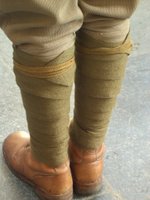 It's not often that you see a man successfully accessorising his khaki green puttees with his World War One military uniform these days however that was my experience in Ieper.
It's not often that you see a man successfully accessorising his khaki green puttees with his World War One military uniform these days however that was my experience in Ieper.Drew and Kevin were standing to attention throughout the ANZAC ceremonies at the Menin Gate in Ieper (Ypres in French). They were still-life subjects when my photography was limited by the number of heads in front of me. Casting about for something 'in theme' my eyes were drawn to Drew's puttees.
After the ceremony, I wandered over for a chat, and in keeping with a time-honoured tradition in both New Zealand and Australia, we retired to the pub for a beer ... the children of the children whose fathers fought for the freedom of towns like Ieper back in the First World War.
Kevin and Drew had an interesting tale to tell, and once I worked out they weren't spinning a yarn, as downunder folk are apt to do when faced with an eager audience ... we talked of adventure and travel.
 They had been walking the Somme, retracing the footsteps of the Australian 12th/40th Battalion via battles they fought; walking and sleeping rough where necessary, employing a military technique known as camouflage and concealment ... which consists of setting up camp after dark and leaving at dawn.
They had been walking the Somme, retracing the footsteps of the Australian 12th/40th Battalion via battles they fought; walking and sleeping rough where necessary, employing a military technique known as camouflage and concealment ... which consists of setting up camp after dark and leaving at dawn.Kevin is an ex-British Army regular now living in Australia and Drew is a 40th Battalion reservist who, signed up when he was 38, with a 3-day equestrian eventing career behind him and an ongoing passion for diving.
Drew showed me the stain of blood on his boots ... they were reproductions of the original boot worn by the ANZACs and had none of the comforts our contemporary soldiers have come to expect. I commented that perhaps this added to the authenticity of their pilgrimmage .. Drew seemed unconvinced about the need for that kind of authenticity.
Kevin laughed, explaining that they were authentic by day however nights were another matter and comfort wasn't something they spurned, although they were sleeping rough when there was no other option, using their Australian issue hoochies or makeshift tents; other times sleeping in first world war pillboxes, in farmers sheds and an old hunting lodge used by the Germans during the war.
 The uniforms had opened doors throughout Belgium and France and the hospitality had astounded the travellers. They had experienced many things, met Mayors and other interesting people, most memorably spending time with a bomb disposal unit in France, admitting that they had been 'as nervous as 6 cats in Ieper'.
The uniforms had opened doors throughout Belgium and France and the hospitality had astounded the travellers. They had experienced many things, met Mayors and other interesting people, most memorably spending time with a bomb disposal unit in France, admitting that they had been 'as nervous as 6 cats in Ieper'.Seeing my confusion they gave me a quick rundown on the history of Ieper, harking back to the Middle Ages when live cats were being thrown from the belfry tower. A little research and I discovered that on the last day of the Annual Market in Ieper's Grote Markt there would be an excess of cats, attracted by the mice attracted by the Market produce and someone came up with the idea that the city jester should throw these excess cats to their death from the tower.
Drew and Kevin's nervousness was induced by the work of the French bomb disposal unit who collect and dispose of highly unstable and ancient explosives; the iron harvest is the explosive legacy of world war, old shells that rise to the surface or are discovered as farmers work over their land. The simple act of building a house or digging a road has an potentially explosive twist to it but I wrote of the work done by the unit in more detail in the ANZAC Day post, so it's easy to imagine why the guys found the unstable nature of the old explosives disturbing to be around ... most particularly the mustard gas shells, still dangerous today.
They had attended a re-enactment of the war, enjoying by the recreation of events long ago; they visited an archeological exploration of a war site and called in at Australian memorials along the way ... disappointed by the state of disrepair they found some in and a little envious of the rumoured 5 million dollars the Canadians were planning to spend on their own memorial restoration.
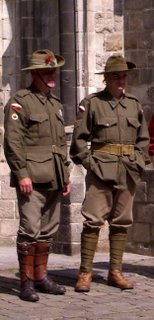 How did it begin ... well, once upon a time, Kevin met a girl ... just as he was heading back to Scotland for a holiday. She was a teacher and he, clearly desiring to seem chivalrous and memorable, offered to take the letters written by her Australian students to a school in Europe.
How did it begin ... well, once upon a time, Kevin met a girl ... just as he was heading back to Scotland for a holiday. She was a teacher and he, clearly desiring to seem chivalrous and memorable, offered to take the letters written by her Australian students to a school in Europe. He was in Scotland for three months, the students exchanged more letters and his girlfriend was invited to to visit the school. He went back with her and revisited historical military sites, making contacts and receiving an official invitation to Ieper ... which led to this third visit with Drew, who will write up the trip and give a lecture to the Battalion back home in Tasmania, Australia.
Eventually our interview ended ... and staying in theme, Kevin's last words to me were a thank you for getting them seats on our bus out to Tyne Cot Cemetery and 'I need to go back and pick up some barbed wire'.
I've no idea why ...
Blogging is like having an office but also keeping a studio where you can experiment, take risks with your craft, and share your discoveries with others.
Chip Scanlon
Poynter Online
Chip Scanlon
Poynter Online
Thursday, April 27, 2006
ANZAC Day in Belgium
 It seems I need to enter the landscape of a story to begin to understand ...
It seems I need to enter the landscape of a story to begin to understand ...I grew up with a Gallipoli veteran; my grandfather was a soldier who after being shipped off the bloodied beaches of the Gelibolu (Gallipoli) Peninsula, found himself fighting in Flanders, Belgium; the place where his horse took the full brunt of a shell that injured him.
He never spoke of the war. We were never taught of it in school ... the so-called Great War never really entered our consciousness while growing up in the 70s. However April 25th would roll round every year and the RSA (Returned Servicemens Association) would sell the little red paper poppies, march through the streets to Dawn Services and gather at war memorials around the country, to lay wreaths on the war momuments in every small and large town throughout the country; remembering the war dead on ANZAC Day.
To not teach us of the reality of war was and continues to be a mistake; it's a lesson that everyone should learn from ... the tragic, horrendous, and often anonymous loss of so many young lives in World War One should have been told over and over to every generation. If only those war veterans had been invited to tell us their truth instead of being encouraged to swallow the horrors of what they had seen.
One of the only positive outcomes of that particular war was the resulting 'birth of nations'. The battleground of Gallipoli was a proving ground for New Zealand, Australia and Turkey; each found their own powerful national identity. New Zealand and Australia finally began to throw off their previously strong connection to 'mother England', and the Turkish Republic rose up from the ashes of war, with Ataturk as their president.
The reality of the Gallipoli campaign went something like this. It took 269 days ... 8556 New Zealanders arrived on the beaches, 4852 were wounded and 2721 were killed. And the Kiwis weren't the only ones to die there, 8709 Australians, 33,072 British, 10,000 French and 87,000 Turks fought were also killed.
 The New Zealanders and the Australians, who were by then known as the ANZACs (Australian and New Zealand Army Corps), left Turkey to the Turks and were diverted to Europe's Western Front in April 1916. And so it was that the New Zealand Division arrived on the flat lands of Flanders in November 1916 and were still there when the Battle of Mesen was launched June 1917.
The New Zealanders and the Australians, who were by then known as the ANZACs (Australian and New Zealand Army Corps), left Turkey to the Turks and were diverted to Europe's Western Front in April 1916. And so it was that the New Zealand Division arrived on the flat lands of Flanders in November 1916 and were still there when the Battle of Mesen was launched June 1917.Yesterday, the New Zealand Embassy in Brussels took a bus full of Kiwis to the ANZAC commemorations here in Belgium. It was delicious to find myself surrounded by quiet Kiwi conversation; possibly quiet by virtue of the 7am departure from Brussels. We arrived in Mesen (Messines in French) in time for the 9am parade through the streets to the Messen war memorial where a small wreath laying ceremony took place. Afterwards we continued on to the New Zealand Memorial, situated up on the infamous Mesen Ridge via Nieuwzeelandersstraat or New Zealanders Street.

The Battle of Mesen ... it was only a name that I knew, nothing more. History tells us that the Germans had taken the village of Mesen, situated up on the 'high ground' ... 30-40 metres above the lowlands that Flanders is famous for; a height that gave the German army a massive advantage.
And so it was that the Allies settled in, periodically attacking while secretly digging deep shafts in under the 10 kilometre long German frontline; filling 21 chambers with enough explosives to create the largest explosion pre-A-bomb.
 After a series of synchronised explosions beginning at 3.10am on 7 June 1917, Allied soldiers attacked the disoriented Germans who had suffered massive losses and Mesen was retaken within hours ... however 700 New Zealanders were killed, 3000 were wounded.
After a series of synchronised explosions beginning at 3.10am on 7 June 1917, Allied soldiers attacked the disoriented Germans who had suffered massive losses and Mesen was retaken within hours ... however 700 New Zealanders were killed, 3000 were wounded. Proof of the ferocity of battles fought in the area can be seen in the contemporary Iron Harvest of local farmers today ... each year at least 200 tons of live shells are dug up or rise to the surface naturally. Live shells are detonated in controlled explosions by the Bomb Disposal team but there are also the gas shells which are far more dangerous. Pre-1970, the Belgians were putting the gas shells into concrete and dumping them in the sea ... environmental awareness stopped the practice but has left them with a problematic stockpile that numbered 27,000 shells in 1998.
Our guide took the bus via her farm to let us view their most recent iron harvest down at the gate, awaiting pick up by the bomb disposal unit or Dovo in Dutch. Her husband had just dug up 31 large shells. Ninety years later and the bomb disposal unit still has controlled detonations of old shells twice daily, five days a week.
 The Battle of Passchendaele was another 'name' I knew, without context. This is a battle that is famous as a defeat, providing New Zealand with its bloodiest day ... 845 kiwi soldiers were killed and 2,700 were wounded but thousands died there.
The Battle of Passchendaele was another 'name' I knew, without context. This is a battle that is famous as a defeat, providing New Zealand with its bloodiest day ... 845 kiwi soldiers were killed and 2,700 were wounded but thousands died there.Our guide put the battle in context for us ... there was an 8km front line, they fought for two weeks in the wettest rain in Belgian history while under bombardment from a well-prepared German army who fired approximately 4.2 million shells atthem.
There were other firsts in area ... mankind continued its ongoing experimentation with death on a large scale. The area has the dubious honour of being the first place to see chlorine gas used however it was only effective for five minutes, and in the course of further experimentation, the highly effective Mustard gas was discovered; a substance which isn't as innocuous as its name suggests, as it remains active for up to eight long and deadly days. It was invisible, adhered to any surface and infiltrated water supplies creating horrendous damage to anyone who came in contact with it.
 Back in the present day and we joined the Australian contingent in Ieper (Ypres in French). We followed the march through the town to Menin Gate where the official wreath-laying ceremony took place. 100,000 Commonwealth soldiers fighting in Flanders have no known grave, 54,900 of those men are listed by name on the massive walls of the Menin Gate ... the covered hall of memory .
Back in the present day and we joined the Australian contingent in Ieper (Ypres in French). We followed the march through the town to Menin Gate where the official wreath-laying ceremony took place. 100,000 Commonwealth soldiers fighting in Flanders have no known grave, 54,900 of those men are listed by name on the massive walls of the Menin Gate ... the covered hall of memory .Ieper was pulverised during the war, nothing was left standing, as was also the case in Mesen. To honour the Allied soldiers who died, Ieper's locals have sounded 'The Last Post' (the traditional salute to fallen soldiers) every night since 1928, as a mark of respect and of gratitude towards those who had given their lives for the freedom and independence of Belgium.
I was intrigued by the two Australian soldiers in the audience ... intrigued because they were dressed in full WWI army kit ... but that's another post.
We finished our journey of rememberance at Tyne Cot Cemetery, one of so many Commonwealth cemeteries scattered throughout Belgium; it's the largest with nearly 12,000 Allied soldiers buried there ... 8.400 of the tombstones are nameless.
It was a sobering day ... much like my trip through the battlefields of Gallipoli.
But ANZAC Day wouldn't be complete without the extract from L Binyon's poem, For the Fallen, quoted at every ceremony:
They shall grow not old, as we that are left grow old,
Age shall not weary them, nor the years condemn.
At the going down of the sun and in the morning,
We will remember them.
Kevin Sites and Cesar Lopez, Columbia
Kevin Sites is over in Columbia and wrote up this interesting story about Cesar Lopez, a musician turning guns into guitars.
Near the piano, on a black stand that resembles a bipod, sits a Winchester lever action rifle. On its polished barrel are four hash marks, representing, says Lopez, the four people killed by it.
But there's much more to the gun than its history: six metal guitar strings stretch from the mid-point of its wooden stock, across the loading chamber, past the fret board threaded over the weapon's barrel, ending at a guitar neck flaring past the muzzle.
It's part of project in which Lopez transforms weapons of war into instruments of killer sound, using them in a kind of political performance art.
Near the piano, on a black stand that resembles a bipod, sits a Winchester lever action rifle. On its polished barrel are four hash marks, representing, says Lopez, the four people killed by it.
But there's much more to the gun than its history: six metal guitar strings stretch from the mid-point of its wooden stock, across the loading chamber, past the fret board threaded over the weapon's barrel, ending at a guitar neck flaring past the muzzle.
It's part of project in which Lopez transforms weapons of war into instruments of killer sound, using them in a kind of political performance art.
Riverbend writes out of Iraq
Riverbend has written a post on the memories of Bibi Z or Granny Z, the 80-something year old they have staying with them as Baghdad hots up.
Bibi Z ... “History repeats itself… Politicians are opportunists… But they don’t worry me- they were bad, but Iraqis were better.” She continued to explain that through all of the drama and change that combine to form the colorful mosaic of the Iraqi political scene during the previous century, one thing remained constant- Iraqi loyalty and solicitude towards one another.
Aljazeera.Net recently interviewed Riverbend here
Bibi Z ... “History repeats itself… Politicians are opportunists… But they don’t worry me- they were bad, but Iraqis were better.” She continued to explain that through all of the drama and change that combine to form the colorful mosaic of the Iraqi political scene during the previous century, one thing remained constant- Iraqi loyalty and solicitude towards one another.
Aljazeera.Net recently interviewed Riverbend here
Amy Gahran on Amateurs and Integrity in Journalism
I thought this was an interesting article.
My attention was particularly captured by Amy Gahran's comment: Here's my favorite quote, and I love it because it's so controversial: "Amateur is not below professional. It's just another way of doing [media]. The root of the word amateur is love, and someone who does something for love is an amateur. Someone who does something to pay the bills is a professional. The amateurs have [more integrity than] the professionals. If you're an amateur you have less conflict of interest and less reason not to tell your truth than if you have to pay the bills and please somebody else."
My attention was particularly captured by Amy Gahran's comment: Here's my favorite quote, and I love it because it's so controversial: "Amateur is not below professional. It's just another way of doing [media]. The root of the word amateur is love, and someone who does something for love is an amateur. Someone who does something to pay the bills is a professional. The amateurs have [more integrity than] the professionals. If you're an amateur you have less conflict of interest and less reason not to tell your truth than if you have to pay the bills and please somebody else."
Monday, April 24, 2006
Tales of a Kiwi Guide in Antwerp
The Canadian's were in town today ...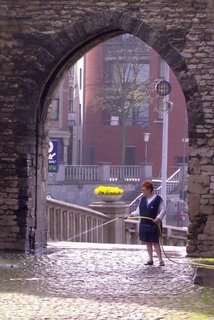
Alison's parents are over from Canada and she wondered if I might like to play tour guide in my Belgian city.
I loved the idea.
We met on De Keyserlei at Exki, more for a mutually known location and coffee than for decor; breakfast too. We took a slow stroll along the Meir; the long car less shopping street that is said to create the backbone of the city. I was aiming for Groenplaats, home to The Hilton hotel and a large statue of the city's most famous son - Rubens, the famous 17th century painter.
Groenplaats or Green Square is still referred to as Groen Kerhof, the Green Cemetery by some; a reference to the fact that the area functioned as a cemetery until the Austrian occupiers abolished the practice of burying the dead inside the city in the 18th century. Today Groenplaats was full of people ... spring was in the air and we hit 18oC as the day progressed.
Alison's dad, a recent convert to Guinness, turned his camera on the Irish Pub on the square's corner, where there was something about pouring a Guinness. It was early in Antwerp and he couldn't be persuaded that a Guinness would be morally fine if we made a small shift to Kiwi time ...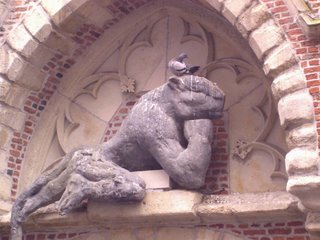
We wandered down Reynders Straat and I pointed out the Genever store along the way ... Advocaat too, stunning stuff. There's this quirky thing about Belgium ... working conditions have been maintained and so it was no surprise to Alison and I when we read that the store didn’t open until midday.
Left onto Hoogstraat and past De Zwarte Panter … the Black Panther art gallery is the contemporary resident in this former 16th century Sint Julianusgasthuis, one of Antwerp’s oldest charitable institutions. For centuries, the tradition of offering a pilgrim’s meal to 12 needy men was continued, in remembrance of the Last Supper.
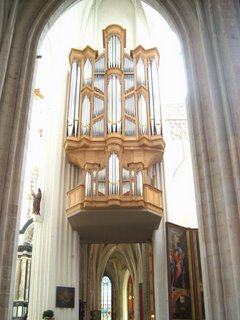 Monday … the first rule of any good guide; first lesson learned by this amateur guide … many many places are closed. I knew it but time and I have never had a good relationship … it takes a traumatic forgetting to remind me to remember these things.
Monday … the first rule of any good guide; first lesson learned by this amateur guide … many many places are closed. I knew it but time and I have never had a good relationship … it takes a traumatic forgetting to remind me to remember these things.
I led them to Grote Pieter Potstraat … medieval in character, it is one of the city’s oldest streets. The Priory of S.Salvator is the only building to survive an ancient past and the street is named after Pieter Pot, a wealthy banker and merchant who was famous for his generosity.
We veered off to the River Schelde and admired the Steen; the waterfront castle that dates from the 12th century, making it the oldest surviving building in Antwerp. It serves as the National Maritime Museum these days but we just strolled around the free edges.
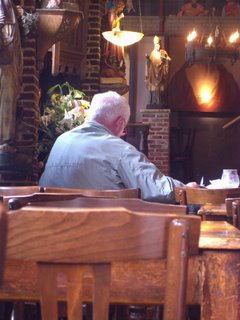 The guide jogged off to check street names before taking her group of 3 into Grote Markt and learning new things about the impressive Brabo Fountain in front of the renaissance architecture of Antwerp’s Town Hall.
The guide jogged off to check street names before taking her group of 3 into Grote Markt and learning new things about the impressive Brabo Fountain in front of the renaissance architecture of Antwerp’s Town Hall.
The statue tells its own story if one is paying attention, a fact I hadn’t noticed until Alison pointed the way. Legend goes that a giant named Antigoon was terrorizing all ships trying to enter the city. Demanding a high toll, he would cut off the hands of any crews failing to meet his demands. In strode Silvius Brabo, the Roman who fought with the giant and won, cutting off Antigoon’s head and his hand … throwing them both in the river.
Antwerpen literally means, to throw the hand.
Onze Lieve Vrouwe Kathedraal was swarming with tourists, and not being that kind of tourist we head for Vlaeykensgang; a 16th century alleyway hidden behind an unobtrusive door on Oude Koornmarkt (although okay, we did enter from Hoogstraat … sometimes I lose streets, it’s a Di thing).
The Kathedraal was still horribly busy so we headed off for the pub of the saints, formerly known as Elfde Gebod, it’s my place … The Eleventh Commandment, previously mentioned here. We ordered a lunch there and found it delicious and cheap … a nice ‘time out’ from touring actually.
We wandered through the Kathedraal, it’s a bit of a must see and only 2euro to enter.
The big plan for the day was Schoonselhof Cemetery. Alison’s great uncle was one of the Commonwealth soldiers buried there and her mother wanted to visit his grave so we caught Tram 24 and went to the end of the line. It’s rather beautiful out there and the military part of the cemetery honours the war dead with tended gardens and uniform headstones.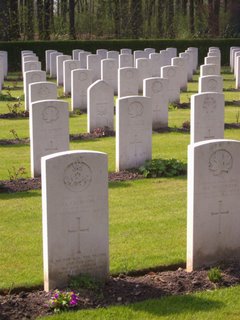
My tour guiding fell to pieces not long after... I invited them home for a drink and rest before they headed back over to Brussels. Tram 24 let me down in unprecedented ways. The roadworks were stunning, slowing our sardine-jammed tram, we passed through the city and were thrown off Tram 24 at Borgerhout … a loudspeaker announcement in Dutch, one I might not have understood but it was acted upon and the tram emptied.
I was too tired for this turn of events but I know this Belgian guy with endless patience ... he got us back on another tram (his life must have been so dull before me and my SOS calls) and we made it home without further incident.
They were really nice people, I had a great day.
Tomorrow I’m up at 4.45am, celebrating my ANZAC Day in Belgium, following the footsteps of my Grandfather who was injured while fighting in Flanders in WW1.
I’ll let you know how it goes.

Alison's parents are over from Canada and she wondered if I might like to play tour guide in my Belgian city.
I loved the idea.
We met on De Keyserlei at Exki, more for a mutually known location and coffee than for decor; breakfast too. We took a slow stroll along the Meir; the long car less shopping street that is said to create the backbone of the city. I was aiming for Groenplaats, home to The Hilton hotel and a large statue of the city's most famous son - Rubens, the famous 17th century painter.
Groenplaats or Green Square is still referred to as Groen Kerhof, the Green Cemetery by some; a reference to the fact that the area functioned as a cemetery until the Austrian occupiers abolished the practice of burying the dead inside the city in the 18th century. Today Groenplaats was full of people ... spring was in the air and we hit 18oC as the day progressed.
Alison's dad, a recent convert to Guinness, turned his camera on the Irish Pub on the square's corner, where there was something about pouring a Guinness. It was early in Antwerp and he couldn't be persuaded that a Guinness would be morally fine if we made a small shift to Kiwi time ...

We wandered down Reynders Straat and I pointed out the Genever store along the way ... Advocaat too, stunning stuff. There's this quirky thing about Belgium ... working conditions have been maintained and so it was no surprise to Alison and I when we read that the store didn’t open until midday.
Left onto Hoogstraat and past De Zwarte Panter … the Black Panther art gallery is the contemporary resident in this former 16th century Sint Julianusgasthuis, one of Antwerp’s oldest charitable institutions. For centuries, the tradition of offering a pilgrim’s meal to 12 needy men was continued, in remembrance of the Last Supper.
 Monday … the first rule of any good guide; first lesson learned by this amateur guide … many many places are closed. I knew it but time and I have never had a good relationship … it takes a traumatic forgetting to remind me to remember these things.
Monday … the first rule of any good guide; first lesson learned by this amateur guide … many many places are closed. I knew it but time and I have never had a good relationship … it takes a traumatic forgetting to remind me to remember these things.I led them to Grote Pieter Potstraat … medieval in character, it is one of the city’s oldest streets. The Priory of S.Salvator is the only building to survive an ancient past and the street is named after Pieter Pot, a wealthy banker and merchant who was famous for his generosity.
We veered off to the River Schelde and admired the Steen; the waterfront castle that dates from the 12th century, making it the oldest surviving building in Antwerp. It serves as the National Maritime Museum these days but we just strolled around the free edges.
 The guide jogged off to check street names before taking her group of 3 into Grote Markt and learning new things about the impressive Brabo Fountain in front of the renaissance architecture of Antwerp’s Town Hall.
The guide jogged off to check street names before taking her group of 3 into Grote Markt and learning new things about the impressive Brabo Fountain in front of the renaissance architecture of Antwerp’s Town Hall.The statue tells its own story if one is paying attention, a fact I hadn’t noticed until Alison pointed the way. Legend goes that a giant named Antigoon was terrorizing all ships trying to enter the city. Demanding a high toll, he would cut off the hands of any crews failing to meet his demands. In strode Silvius Brabo, the Roman who fought with the giant and won, cutting off Antigoon’s head and his hand … throwing them both in the river.
Antwerpen literally means, to throw the hand.
Onze Lieve Vrouwe Kathedraal was swarming with tourists, and not being that kind of tourist we head for Vlaeykensgang; a 16th century alleyway hidden behind an unobtrusive door on Oude Koornmarkt (although okay, we did enter from Hoogstraat … sometimes I lose streets, it’s a Di thing).
The Kathedraal was still horribly busy so we headed off for the pub of the saints, formerly known as Elfde Gebod, it’s my place … The Eleventh Commandment, previously mentioned here. We ordered a lunch there and found it delicious and cheap … a nice ‘time out’ from touring actually.
We wandered through the Kathedraal, it’s a bit of a must see and only 2euro to enter.
The big plan for the day was Schoonselhof Cemetery. Alison’s great uncle was one of the Commonwealth soldiers buried there and her mother wanted to visit his grave so we caught Tram 24 and went to the end of the line. It’s rather beautiful out there and the military part of the cemetery honours the war dead with tended gardens and uniform headstones.

My tour guiding fell to pieces not long after... I invited them home for a drink and rest before they headed back over to Brussels. Tram 24 let me down in unprecedented ways. The roadworks were stunning, slowing our sardine-jammed tram, we passed through the city and were thrown off Tram 24 at Borgerhout … a loudspeaker announcement in Dutch, one I might not have understood but it was acted upon and the tram emptied.
I was too tired for this turn of events but I know this Belgian guy with endless patience ... he got us back on another tram (his life must have been so dull before me and my SOS calls) and we made it home without further incident.
They were really nice people, I had a great day.
Tomorrow I’m up at 4.45am, celebrating my ANZAC Day in Belgium, following the footsteps of my Grandfather who was injured while fighting in Flanders in WW1.
I’ll let you know how it goes.
Sunday, April 23, 2006
An interesting link
The Port of Antwerp and a little more
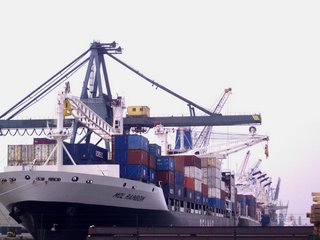 We went wandering today ... over to Putte in the Netherlands. We wanted to buy a few things that don't quite make it into Belgium.
We went wandering today ... over to Putte in the Netherlands. We wanted to buy a few things that don't quite make it into Belgium. Putte's close, the border is less than 30kms from home but we took the longest way, through Antwerp's port area ... photographing whatever we fancied along the way.
The Port of Antwerp is second only to Rotterdam, making it Europe's second biggest and the world's fourth largest port. In its quiet way it plays a leading role in international trade ... warehousing, packing, repacking, distribution and forwarding are all a part of everyday life here.
 Two hundred and fifty trains come into and leave from the port on a daily basis. Almost half of the goods that pass through are dry or liquid bulk; goods like grain, coal, fertiliser, chemical and petroleum products. Port operators have over 5 million m2 in warehouse space for the specialised handling of iron and steel, fruit, forest products, cars, dangerous goods and sugar.
Two hundred and fifty trains come into and leave from the port on a daily basis. Almost half of the goods that pass through are dry or liquid bulk; goods like grain, coal, fertiliser, chemical and petroleum products. Port operators have over 5 million m2 in warehouse space for the specialised handling of iron and steel, fruit, forest products, cars, dangerous goods and sugar.Antwerp is also one of the world's largest maritime centres for chemical and petrochemical production, second only to Houston,Texas. The container terminals in the port handle over six million TEU (twenty foot equivalent units) which makes it the third largest container port in Europe and approximately tenth in the world.
Antwerp continues to surprise me, slowly revealing herself as a major player in the diamond industry; a major maritime transport and logistics centre; as the (petro) chemical capital of Europe, and then there's the fashion ... with Bikkembergs and Van Noten to name only two of the famous 'Antwerp Six'
Mum
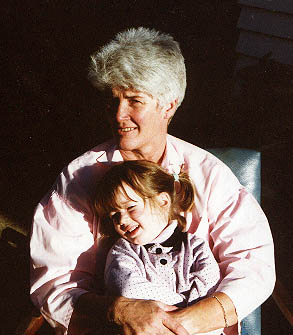 I was thinking of my mother this morning, annoyed that she's no longer here to just phone because I am thinking of her, then so sad when I remembered...
I was thinking of my mother this morning, annoyed that she's no longer here to just phone because I am thinking of her, then so sad when I remembered...Odd things make me think of her.
Our balcony garden. It's under construction ... a twinkle in the eye, a wrinkle in the wallet. I told Gert of mum, explaining that if she flew in from New Zealand she would make the balcony garden her project and we'd be left with something quite stunning.
My parents loved gardening ... dad still does but mum died back in 1999 and this morning I miss her. She was so full of life, in ways that I didn't understand until later; until I could compare her with others.
In retrospect I see that my mother was fearless ... or perhaps it was that she wasn't afraid to do things that scared her. She did things ahead of her time and moved onto the next thing as she grew. She married my father back in '63 and they had 4 kids. They bought a house and made it our home, creating a constantly changing garden of vegetables and flowers; we buried our pets there over the years.
Back then, Dad was a plasterer, painter and paperhanger. He was perfect for her ... she would have an decorating idea and he would come home to a paperless room and a wife with a plan for his weekend. It makes me smile to remember some of her surprises. She was cute like that and completely shameless about whatever it was that she had done.
Mum was a mother but she did other things too ... she worked as a groundswoman at the school next door to our place, she loved driving the tractor that mowed the massive grass areas in our school. She worked in a small sheepskin factory for a while and then, as her children and confidence grew, she went back to school for secreterial qualifications ... shy and uncertain of self in a strange way, she did things anyway. She was rapt when she was hired by a government department.
She never stopped being our mother, in her way, and her way was special ... a little bit like her cooking, which was memorable. My friends seemed to love coming over to my place .. much to my teenage embarassment, and she helped them when they organised a couple of surprise birthdays for me or perhaps they were her idea, I don't know for sure. My boyfriends came over and hung round too, enjoying the sweet fun of her.
I was a year married when she informed me I was pregnant meanwhile I was imagining mononucleosis again ... and later she came to visit me as a new mum, told me that I was doing well and left on the same day. It took a long time to forgive her for that but I understand now.
She was so full of life when they told her the cancer was terminal. She was working plans to explore the world some, and she'd always had this dream of living in a house next to the sea.
Her liver had been paining her a little and my mum, who liked the occasional gin, asked me if I thought it might be the alcohol. I laughed at her then, my mum never drank enough to do any harm to her liver.
We had just over 3 months with her after that ... chance found me living at home for a while, living between two towns and two families - the old and the new. I was finally earning my university degree when she began dying. I was lucky to be there in those days.
She became defined by her 'dont worry, be happy', trying for smiles from those who were already mourning her loss.
When she died her farewell filled the church ...there were people who really cared about her; it would have surprised her I think, she was like that, not understanding the impact she made.
She had planned her own funeral and almost devastated us with some of the music she chose ... Queen was most poignant, played full volume in the local Catholic church.
I was given my first speaking engagement ... farewelling my mum with instructions not to single out anyone for special thanks because there really were too many people to thank, she didn't want to forget or undervalue anyone. I worked on that speech for hours on the night before the funeral ... had computer crashes, memory failures ... strange unexplained things, each time I tried to break her rules and just thank her doctor or some other person who had been so important.
That was mum ...
Someplace Else
Imagine if she didn't really die
That it was her I saw this morning
at breakfast, by the window that
looked out over the bay.
That our pain was imagined, and
her pain was a nightmare of mine.
That this morning I woke up and
remembered she lived someplace else.
Or maybe I just caught a small glimpse of her heaven
A cottage, with a big window and a view out over the sea.
Saturday, April 22, 2006
Samuel G. Freedman on Poynter Online
"Letters to a Young Journalist" doesn't shy away from the hard truths of the newsroom. "Journalism," Freedman writes, "is a business of proving yourself anew every single story, every single day... None of us are in this for the money or the acclaim."
Samuel G. Freedman
Poynter Online, everything you need to be a better journalist ...
It's an interesting site but today it was the article titled 'The Wisdom of Ages: Letters to a Young Journalist' that drew me in.
Chip Scanlan's interview with Samuel G. Freedman, 'author of a new book of wisdom for young (and not-so-young-anymore) journalists' is worth reading.
Scanlan quotes John Steinbeck's words to a young writer in the introduction to his interview with Freedman: "Forget your generalized audience. In the first place, the nameless, faceless audience will scare you to death and in the second place, unlike the theatre, it doesn't exist. I have found that sometimes it helps to pick out one person, a real person you know, or an imagined person -- and write to that one."
There's an excerpt from Freedman's book here, taken from the chapter titled 'Tacking'
As a reporter you will be tacking, too, between the shores of truth and justice, trying to hold your direction true north. Our lives would be easier, though much less interesting, if truth and justice were always on the same side, if human events were a pageant of good versus evil. As the Rwanda genocide and the Enron fraud show, there are times when the world does divide in such a polar way, and those times can lift a burden from a journalist's conscience.
Chip asked, 'Why did you write "Letters to a Young Journalist?' and Freedman replied with, 'The narrow, literal answer would be that Basic Books asked me. Basic has been doing a series of mentoring books modeled on [Rainer Maria] Rilke's famous "Letters To A Young Poet.'"
But I liked this part of his answer more, I savored the chance to write about how a journalist encounters the world, engages with it, makes sense of it in written or broadcast form.
Gangrey.com posts some great stories. Yes, guilty again but I needed to write this up for future reference.
Samuel G. Freedman
Poynter Online, everything you need to be a better journalist ...
It's an interesting site but today it was the article titled 'The Wisdom of Ages: Letters to a Young Journalist' that drew me in.
Chip Scanlan's interview with Samuel G. Freedman, 'author of a new book of wisdom for young (and not-so-young-anymore) journalists' is worth reading.
Scanlan quotes John Steinbeck's words to a young writer in the introduction to his interview with Freedman: "Forget your generalized audience. In the first place, the nameless, faceless audience will scare you to death and in the second place, unlike the theatre, it doesn't exist. I have found that sometimes it helps to pick out one person, a real person you know, or an imagined person -- and write to that one."
There's an excerpt from Freedman's book here, taken from the chapter titled 'Tacking'
As a reporter you will be tacking, too, between the shores of truth and justice, trying to hold your direction true north. Our lives would be easier, though much less interesting, if truth and justice were always on the same side, if human events were a pageant of good versus evil. As the Rwanda genocide and the Enron fraud show, there are times when the world does divide in such a polar way, and those times can lift a burden from a journalist's conscience.
Chip asked, 'Why did you write "Letters to a Young Journalist?' and Freedman replied with, 'The narrow, literal answer would be that Basic Books asked me. Basic has been doing a series of mentoring books modeled on [Rainer Maria] Rilke's famous "Letters To A Young Poet.'"
But I liked this part of his answer more, I savored the chance to write about how a journalist encounters the world, engages with it, makes sense of it in written or broadcast form.
Gangrey.com posts some great stories. Yes, guilty again but I needed to write this up for future reference.
The Journey is the Destination ...
Sometimes the trail of a post is long and it's difficult to give credit where credit is due but do it I must, especially when I find some interesting things along the way.
I was reading Erkan this morning and discovered a link to the cyberjournalist's top newsites for March 2006 and while meandering there, I noticed a Tips and Tools link on the left sidebar ...
Clicking 'tips and tools' took me to another place where I noticed this slightly irresistible link, Online inspiration , which led me to gangrey.com where the author writes that he is, Prolonging the slow death of newspapers in his header and describes his site as: A writer's approach to helping bail water out of a sinking ship.
It's a delicious site, and it was here that I found the previous post about Jacob Christiano, the sidewalk poet.
'There' ... she writes, dusting her hands off. 'I think everyone has been credited now.'
I was reading Erkan this morning and discovered a link to the cyberjournalist's top newsites for March 2006 and while meandering there, I noticed a Tips and Tools link on the left sidebar ...
Clicking 'tips and tools' took me to another place where I noticed this slightly irresistible link, Online inspiration , which led me to gangrey.com where the author writes that he is, Prolonging the slow death of newspapers in his header and describes his site as: A writer's approach to helping bail water out of a sinking ship.
It's a delicious site, and it was here that I found the previous post about Jacob Christiano, the sidewalk poet.
'There' ... she writes, dusting her hands off. 'I think everyone has been credited now.'
Jacob Christiano, Poet
I loved this story by Lane DeGregory in the St Petersburg Times online.
'The poems appear on city sidewalks, written in pastel chalk. Words of love bloom outside a chocolate shop; verses about the rain emerge beside a nail salon.
Every letter is precise, as if a human typewriter click-clacked Courier Bold characters across the concrete:
I saw you today
 How beautiful you looked,
How beautiful you looked,
Lost in the distance
Of so long a silence.
Each line has its own hue: butter yellow, mint green, orange sherbet. The colors spill across 10 feet of sidewalk.
He signs the poem, adds a fake copyright symbol above his fake name.
So who is he really, you ask. Why the veil of secrecy?
The poet smiles. He looks to the sky. Again, he gives a sideways answer:
"T.S. Eliot said,'the more perfect the artist, the more separation there will be between the man who suffers and the art he produces.'
'The poems appear on city sidewalks, written in pastel chalk. Words of love bloom outside a chocolate shop; verses about the rain emerge beside a nail salon.
Every letter is precise, as if a human typewriter click-clacked Courier Bold characters across the concrete:
I saw you today
 How beautiful you looked,
How beautiful you looked,Lost in the distance
Of so long a silence.
Each line has its own hue: butter yellow, mint green, orange sherbet. The colors spill across 10 feet of sidewalk.
He signs the poem, adds a fake copyright symbol above his fake name.
So who is he really, you ask. Why the veil of secrecy?
The poet smiles. He looks to the sky. Again, he gives a sideways answer:
"T.S. Eliot said,'the more perfect the artist, the more separation there will be between the man who suffers and the art he produces.'
Friday, April 21, 2006
The Green Street Girl writes
Mark J was my neighbour when I was young and he was always the sweetest guy ... the guy who was sweet on my sister.
I strolled over to his blogsite today and found this ... it's delicious, and a small glimpse of growing up Kiwi.
I'll have to get permission from my little sister to send him her photo for his post ... but first I have to do some maths, as in 'When am I next going back to New Zealand divided by How long is my sister's memory.'
I strolled over to his blogsite today and found this ... it's delicious, and a small glimpse of growing up Kiwi.
I'll have to get permission from my little sister to send him her photo for his post ... but first I have to do some maths, as in 'When am I next going back to New Zealand divided by How long is my sister's memory.'
The Galleries Show, Extra City, Antwerpen
Gert came home with tickets to the 19 April opening preview of the Galleries Show at Extra City.
The introduction online read, The Galleries Show is an exhibition project that invites galleries to participate as curatorial agents in a 5-day fair project.
Extra City invited 11 galleries to participate to the project. Each of the participating galleries in the fair was invited to select a second gallery. The total number of galleries participating to The Galleries Show is limited to 22.
I was so excited ... artists and their work were coming from New York, London, Brussels, Cologne, Puerto Rico, Berlin, Mexico Cty, LA, Guadalajara, Oslo and Naples but when I arrived, I discovered that the art had made a leap to a place where I couldn't follow.
We wandered round the entire exhibition twice and the feeling of being Alice in Wonderland was enhanced by the 3 or 4 male joggers who constantly passed by wearing underpants and tight t-shirts.
For me, and perhaps I'm a philistine ... the beauty of the exhibition was that it made the cityscape seem quite stunning when I re-entered the outside world. I wished for a camera in those first moments outside because I'm not sure I'll ever see the city in quite that way again.
I think the key to the exhibition might be found in these words, 'the galleries invited to participate are pioneering platforms that have manifested themselves in the recent past through articulating new economies for art, in singling out new relationships between art and the public realm.
Meanwhile, Kutluğ Ataman's project titled Küba, is still showing at another Extra City Gallery and it's the one I really want to see. It reads, Küba is a project by the Turkish video artist Kutluğ Ataman. On 40 old television sets stacked up in an old harbour warehouse, an equal number of people tell their stories about a unique society in the slums of Istanbul. All sorts of people live in Küba: criminals, drug addicts, teenage delinquents, religious extremists and the poorest of the poor rub shoulders with one another there. Nobody is able to tell us where Küba is, precisely, or how it got its name. Some think that it is on the south side of Istanbul, others situate Küba near the airport. What is certain is that sometimes life can be pretty hard in Küba.
The introduction online read, The Galleries Show is an exhibition project that invites galleries to participate as curatorial agents in a 5-day fair project.
Extra City invited 11 galleries to participate to the project. Each of the participating galleries in the fair was invited to select a second gallery. The total number of galleries participating to The Galleries Show is limited to 22.
I was so excited ... artists and their work were coming from New York, London, Brussels, Cologne, Puerto Rico, Berlin, Mexico Cty, LA, Guadalajara, Oslo and Naples but when I arrived, I discovered that the art had made a leap to a place where I couldn't follow.
We wandered round the entire exhibition twice and the feeling of being Alice in Wonderland was enhanced by the 3 or 4 male joggers who constantly passed by wearing underpants and tight t-shirts.
For me, and perhaps I'm a philistine ... the beauty of the exhibition was that it made the cityscape seem quite stunning when I re-entered the outside world. I wished for a camera in those first moments outside because I'm not sure I'll ever see the city in quite that way again.
I think the key to the exhibition might be found in these words, 'the galleries invited to participate are pioneering platforms that have manifested themselves in the recent past through articulating new economies for art, in singling out new relationships between art and the public realm.
Meanwhile, Kutluğ Ataman's project titled Küba, is still showing at another Extra City Gallery and it's the one I really want to see. It reads, Küba is a project by the Turkish video artist Kutluğ Ataman. On 40 old television sets stacked up in an old harbour warehouse, an equal number of people tell their stories about a unique society in the slums of Istanbul. All sorts of people live in Küba: criminals, drug addicts, teenage delinquents, religious extremists and the poorest of the poor rub shoulders with one another there. Nobody is able to tell us where Küba is, precisely, or how it got its name. Some think that it is on the south side of Istanbul, others situate Küba near the airport. What is certain is that sometimes life can be pretty hard in Küba.
Le Huitième Jour and Daniel Auteuil
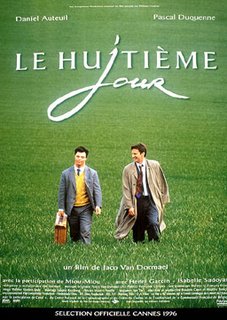 Daniel Auteuil is my favourite French actor and so when I saw Le Huitième Jour I couldn't resist.
Daniel Auteuil is my favourite French actor and so when I saw Le Huitième Jour I couldn't resist. Le Huitième Jour translates to 'The Eighth Day' and it's kind of like buying yourself a little piece of magic.
Dan, from Northern Ireland said it best when he wrote, 'This is the French and Belgians doing what they do best. It's quirky, visually inventive, exhilarating and emotionally challenging storytelling. Director Jaco van Dormael takes us into the world of Georges, a Down's Syndrome sufferer and his quest for a meaningful relationship with someone, just anyone. This is not done in a patronising way but with a great sense of fun and also honesty. Georges' interplay with corporate management guru, Harry is dazzlingly handled - shifting from comedy to tragedy back to comedy again with breathtaking ease.'
Library Thing
I don't know if you have noticed 'Library Thing' on the left side of my blog ... anyone can sign up and get their own homepage.
It's so simple to search books based on a remembered title or a loved author, and then have them catalogued and online. My home page looks like this and has nothing to do with anything resembling technical competence on my part.
It's so simple to search books based on a remembered title or a loved author, and then have them catalogued and online. My home page looks like this and has nothing to do with anything resembling technical competence on my part.
Brussels Maps and Di
Brussels, like most cities, can be experienced on different levels ...
There's the sight-seeing tourist level and then there's the 'this-map-isn't-very-good-and-I-don't-speak-French' experience. And my Dutch isn't that useful either actually.
Yesterday's adventure began in Brussel's Centraal Station... a location that morphs into Gare Centrale in French, after crossing one of the many internal language borders within Belgium. Suddenly people are giving me directions that involve Gare du Noord previously painstakingly learned as Brussel Nord ... and Bruxelles Midi is Brussel Zuid otherwise known as Brussels South to an speaker of Engels.
I made a good beginning, arriving in Brussels at 10.00am, with half an hour to follow the less than satisfactory map to my first appointment. I exited the station on Putterie, stunned at my own cleverness ... having emerged from the rabbit warren on the correct street. I casually turned the map, trying to locate myself in terms of left or right ... then I noticed the buses. I had a list of bus numbers that gave me 8 chances of finding a bus for Square de Meeus.
Often shameless about the linguistic deficiencies I suffer from; deficiences unimaginable to most Brusselians, I chatted to the bus driver on Number 60 in English. He broke, beginning in French but responding to the blushing flustered foreigner he switched to English, promising to let me know when we reached our destination.
He did. I was there 15 minutes early.
I was picking up documents at the New Zealand Embassy and what a breath of fresh Kiwi air that was. It was all friendliness and efficiency, something I haven't experienced at a bureaucratic level in such a long time. I remember a policeman in Istanbul said such bad things about me that my translator had blushed and refused to translate ... that was the time I was told that my official work permit was fradulent. I envisioned prison but it was just the first round at the bargaining table. Obviously most experiences are better than that however Belgium has some very serious rules for immigrants and my 'you're on candid camera-like' experiences are growing.
I was given another map with new directions to my next destination. There was a predicted difficulty in crossing a mess of roads halfway there and so I left, knowing it was unlikely I would find my way onto Rue Brederode.
Eventually I sent Gert a small yet subtle sms ... 'I'm lost'.
He's a patient man. He phoned immediately and began the process of getting me to believe that he understood where I was and that his directions were good. It's not that I'm ungrateful, it's just that I'm directionally challenged and so when he tells me to turn right and go under the arch then on up the little street ... I doubt him.
He got me back on the map and I wandered on, finding my way to destination two ... it was only 11.30am.
I smsed Shannon, an American expat (and my hairdresser after two or three big glasses of red wine) and we met up for a long lunch at a sidewalk cafe somewhere off the edge of my mapped world.
Clearly I was in her hands at this point, being in unknown territory and having only found our meeting place thanks to a lovely cafe owner who had turned me back towards the Metro meeting place when I stopped for guidance. I had really thought about left or right after leaving Rue des Petits Carmes ... but really thinking about which road to take usually leaves me on the road best not taken.
Later, Shannon introduced me to the underground Metro and I made my way to Bruxelles Midi (previously Brussel Zuid) and I was lost again. It's a nightmare down there ... there are levels and a shopping complex. I tried for an insouciant look while wondering WHERE the ticket office might be.
I asked at the info booth and was told ... I found it eventually and watched my Antwerpen train pull away just as I arrived on the platform.
There's always another train in Belgium and the new one was an old clanker that stopped everywhere between Brussels and Antwerpen. I had checked the timetable tv, I had noted the number of fellow passengers thinking 'Ah yes, this is surely city to city' and we travelled through Centraal Station, on through Brussel Nord. I knew where I was.
However, slowly but surely I was once again off the map and in unknown territory. Soon I recognised nothing but I kind of liked the idea of an adventure someplace else in Belgium. We stopped at places with names I'd never heard spoken.
Just as I was getting tired of the whole 'where in the world is Di' thing, the ticket inspector came round. He may have wondered why he was studied as he read my ticket ... it was a rather intense stare, the kind one does when wondering if they've passed the test of boarding the right train. Of course I'd passed, he clicked it ... a few minutes later we pulled into Berchem.
I was home.
There's the sight-seeing tourist level and then there's the 'this-map-isn't-very-good-and-I-don't-speak-French' experience. And my Dutch isn't that useful either actually.
Yesterday's adventure began in Brussel's Centraal Station... a location that morphs into Gare Centrale in French, after crossing one of the many internal language borders within Belgium. Suddenly people are giving me directions that involve Gare du Noord previously painstakingly learned as Brussel Nord ... and Bruxelles Midi is Brussel Zuid otherwise known as Brussels South to an speaker of Engels.
I made a good beginning, arriving in Brussels at 10.00am, with half an hour to follow the less than satisfactory map to my first appointment. I exited the station on Putterie, stunned at my own cleverness ... having emerged from the rabbit warren on the correct street. I casually turned the map, trying to locate myself in terms of left or right ... then I noticed the buses. I had a list of bus numbers that gave me 8 chances of finding a bus for Square de Meeus.
Often shameless about the linguistic deficiencies I suffer from; deficiences unimaginable to most Brusselians, I chatted to the bus driver on Number 60 in English. He broke, beginning in French but responding to the blushing flustered foreigner he switched to English, promising to let me know when we reached our destination.
He did. I was there 15 minutes early.
I was picking up documents at the New Zealand Embassy and what a breath of fresh Kiwi air that was. It was all friendliness and efficiency, something I haven't experienced at a bureaucratic level in such a long time. I remember a policeman in Istanbul said such bad things about me that my translator had blushed and refused to translate ... that was the time I was told that my official work permit was fradulent. I envisioned prison but it was just the first round at the bargaining table. Obviously most experiences are better than that however Belgium has some very serious rules for immigrants and my 'you're on candid camera-like' experiences are growing.
I was given another map with new directions to my next destination. There was a predicted difficulty in crossing a mess of roads halfway there and so I left, knowing it was unlikely I would find my way onto Rue Brederode.
Eventually I sent Gert a small yet subtle sms ... 'I'm lost'.
He's a patient man. He phoned immediately and began the process of getting me to believe that he understood where I was and that his directions were good. It's not that I'm ungrateful, it's just that I'm directionally challenged and so when he tells me to turn right and go under the arch then on up the little street ... I doubt him.
He got me back on the map and I wandered on, finding my way to destination two ... it was only 11.30am.
I smsed Shannon, an American expat (and my hairdresser after two or three big glasses of red wine) and we met up for a long lunch at a sidewalk cafe somewhere off the edge of my mapped world.
Clearly I was in her hands at this point, being in unknown territory and having only found our meeting place thanks to a lovely cafe owner who had turned me back towards the Metro meeting place when I stopped for guidance. I had really thought about left or right after leaving Rue des Petits Carmes ... but really thinking about which road to take usually leaves me on the road best not taken.
Later, Shannon introduced me to the underground Metro and I made my way to Bruxelles Midi (previously Brussel Zuid) and I was lost again. It's a nightmare down there ... there are levels and a shopping complex. I tried for an insouciant look while wondering WHERE the ticket office might be.
I asked at the info booth and was told ... I found it eventually and watched my Antwerpen train pull away just as I arrived on the platform.
There's always another train in Belgium and the new one was an old clanker that stopped everywhere between Brussels and Antwerpen. I had checked the timetable tv, I had noted the number of fellow passengers thinking 'Ah yes, this is surely city to city' and we travelled through Centraal Station, on through Brussel Nord. I knew where I was.
However, slowly but surely I was once again off the map and in unknown territory. Soon I recognised nothing but I kind of liked the idea of an adventure someplace else in Belgium. We stopped at places with names I'd never heard spoken.
Just as I was getting tired of the whole 'where in the world is Di' thing, the ticket inspector came round. He may have wondered why he was studied as he read my ticket ... it was a rather intense stare, the kind one does when wondering if they've passed the test of boarding the right train. Of course I'd passed, he clicked it ... a few minutes later we pulled into Berchem.
I was home.
Robert Fisk
Erkan wrote of a 3 hour speech recently given by war journalist, Robert Fisk
The article appeared in NYC Indymedia.org ...This intrepid investigative journalist, who, in his more than 30 years of war reporting, has seen enough carnage to last several lifetimes, addressed global issues such as U.S. imperialism in the Mid-East and Transcaucasus, and the implications for small, struggling nations like Armenia. As his publishers rightly describe, Fisk has earned the reputation for “being passionate in his concerns about the Middle East, and relentless in his pursuit of the truth -- traits that have enabled him to enter the world of the Middle East and the lives of its people as few other journalists have.” He is a seven-time recipient of the British Press Awards’ International Journalist of the Year Award and the author of Pity the Nation: The Abduction of Lebanon (Nation Books).
In his introductory remarks, Antranig Kasbarian of the Armenian Revolutionary Federation called Fisk “a man of integrity who has put himself in the line of fire in countless wars and invasions, including those in Lebanon, Afghanistan, and Iraq.” The capacity crowd gave Fisk a standing ovation as they were told that Fisk “deserves our appreciation -- even before he utters a word -- for continuing to show a high level of courage in his factual, unflinching war reportage at a time when it is considered unfashionable, if not prohibiting, to criticize U.S. foreign policy.”
The article appeared in NYC Indymedia.org ...This intrepid investigative journalist, who, in his more than 30 years of war reporting, has seen enough carnage to last several lifetimes, addressed global issues such as U.S. imperialism in the Mid-East and Transcaucasus, and the implications for small, struggling nations like Armenia. As his publishers rightly describe, Fisk has earned the reputation for “being passionate in his concerns about the Middle East, and relentless in his pursuit of the truth -- traits that have enabled him to enter the world of the Middle East and the lives of its people as few other journalists have.” He is a seven-time recipient of the British Press Awards’ International Journalist of the Year Award and the author of Pity the Nation: The Abduction of Lebanon (Nation Books).
In his introductory remarks, Antranig Kasbarian of the Armenian Revolutionary Federation called Fisk “a man of integrity who has put himself in the line of fire in countless wars and invasions, including those in Lebanon, Afghanistan, and Iraq.” The capacity crowd gave Fisk a standing ovation as they were told that Fisk “deserves our appreciation -- even before he utters a word -- for continuing to show a high level of courage in his factual, unflinching war reportage at a time when it is considered unfashionable, if not prohibiting, to criticize U.S. foreign policy.”
Thursday, April 20, 2006
Spain's Wandering Woman and Semana Santa
I had never heard of Spain's Semana Santa celebrations until Salamanca's wandering woman mentioned a haunting procession that passed by her window while she was reading late one night.
Tonight I found her post about Semana Santa ... it makes interesting reading if you're curious.
Tonight I found her post about Semana Santa ... it makes interesting reading if you're curious.
An Adventure
I'm off to Brussels today, with a map (not a very good map), multiple exits from Centraal Station, and an idea of where I'm meant to be ... as in somewhere I've been once before, although driven by car.
I have half an hour to find the first location and afterwards, I'm meant to travel onto the next location ... in another area.
Let's see how it goes ...
I have half an hour to find the first location and afterwards, I'm meant to travel onto the next location ... in another area.
Let's see how it goes ...
Wednesday, April 19, 2006
Dunedin, New Zealand
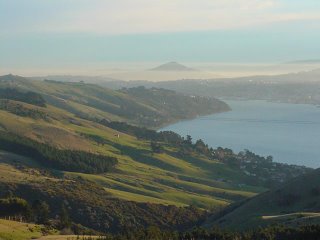 Dunedin ... it's home for me and when I get homesick, I travel its roads and revisit the places of memory.
Dunedin ... it's home for me and when I get homesick, I travel its roads and revisit the places of memory.My favourite place in the city was Otago Peninsula, I would drive out on the low road, alongside the harbour and come back over the high road, past the stone walls built by Scottish settlers in the late 19th century ... the approach to the city is stunning from up there.
The peninsula road, otherwise known as Portobello Road, winds its way around the edge of Dunedin's Otago harbour. You pass through picturesque little villages like MacAndrew Bay, Broad Bay and Portobello, driving on until you reach Taiaroa Head ... with cliffs that plunge straight down and into the Pacific Ocean.
Taiaroa Head is home to the only mainland-based albatross colony in the world. This giant bird, with a wing span of up to 3 metres, flies an estimated 190,000 km per year and lays its single egg at the colony. Hatched, the young birds grow and leave the peninsula, following an instinct to skim oceans, only coming back to breed after 3 to 6 years.
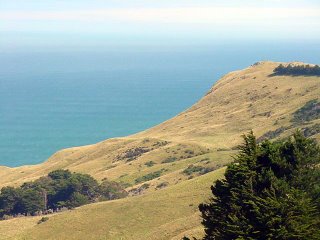 Although you pay to visit the albatross, on the beach below you can wander freely, sometimes amongst seals, sometimes watching the penguins come home in the evening. Our beaches are stunning places. I've shared them with sea lions, seals and an injured Leopard seal; I've watched various penguin breeds come home in the late afternoon, and baby seals riding the waves just a few metres in front of me. And although I didn't know it until years later, Dunedin has more than its fair share of sharks ... my old and beloved swimming beach, Brighton, is rumoured to be a shark breeding ground. St Kilda, a city beach, has been the scene of two deaths by shark. Nevertheless Dunedin has a big surfing population of hardy souls who regularly brave the cold waters.
Although you pay to visit the albatross, on the beach below you can wander freely, sometimes amongst seals, sometimes watching the penguins come home in the evening. Our beaches are stunning places. I've shared them with sea lions, seals and an injured Leopard seal; I've watched various penguin breeds come home in the late afternoon, and baby seals riding the waves just a few metres in front of me. And although I didn't know it until years later, Dunedin has more than its fair share of sharks ... my old and beloved swimming beach, Brighton, is rumoured to be a shark breeding ground. St Kilda, a city beach, has been the scene of two deaths by shark. Nevertheless Dunedin has a big surfing population of hardy souls who regularly brave the cold waters.The harbour-side of the peninsula is rolling hills, space and light; the east coast Pacific ocean side has always seemed brooding to me ... I'm not sure why. It's wilder, with steep hills that dramatically drop away into the ocean however I did love sitting just below the top of the hill in the second photograph ... you look out over the ocean, knowing there's nothing for thousands of kilometres ... it was a favourite place.
 My passion for Dunedin was definitely centered around the harbour ... a clear frosty night gave the morning reward of a harbour so still that it looked like glass ... I used to disappear with my camera searching for photographs; expeditions that resulted in a collection of rowboats on still water. I could never resist just one more boat.
My passion for Dunedin was definitely centered around the harbour ... a clear frosty night gave the morning reward of a harbour so still that it looked like glass ... I used to disappear with my camera searching for photographs; expeditions that resulted in a collection of rowboats on still water. I could never resist just one more boat.But there is so much more to Dunedin ... the first European settlers arrived hundreds of years after the original Maori settlers and took over. An act that wasn't redressed until the end of the 20th century ... when attempts to honor the Treaty of Waitangi were finally made. However, back in 1848, 97 passengers on the John Wickliffe arrived in the Port of Otago ... 4 months after leaving the British Isles and sailing across the Atlantic, then round the Cape of Good Hope on Africa's southern tip before being blown across the roaring 40's in the southern ocean. They traveled south under Australia then on round the southern coast of New Zealand before heading north and docking at the Port of Otago.
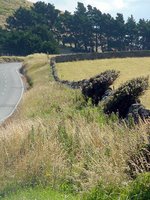 The name Dunedin is the old Gaelic name for Edinburgh and that Scottish flavour is still present today ... found in our pipe bands, haggis ceremonies and perhaps in our general sensibility. The Scots made two major contributions to Dunedin ... education and religion; setting a stiff religious tone that invited a creative rebellion in the poets, musicians and writers of later generations ... James K Baxter and Janet Frame to name two.
The name Dunedin is the old Gaelic name for Edinburgh and that Scottish flavour is still present today ... found in our pipe bands, haggis ceremonies and perhaps in our general sensibility. The Scots made two major contributions to Dunedin ... education and religion; setting a stiff religious tone that invited a creative rebellion in the poets, musicians and writers of later generations ... James K Baxter and Janet Frame to name two.Otago University was founded in 1869 and is the oldest in New Zealand. Otago Boys High School was founded in 1864, and Otago Girls High followed in 1871 - it was the first state run secondary school for girls in the world.
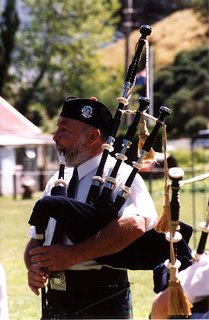 But the Scots weren't the only influence, a goldrush began in 1861 and meant that Dunedin's Port of Otago created a wee economic miracle for some years, as an entry point for men and goods and an exit point for gold. As a result of this economic boom, we have a rather wonderfully diverse, if unusual, collection of architecture... there are few places in the world where such a variety of architectural styles can be seen virtually rubbing shoulders with each other. From the Flemish Renaissance railway station, one's eye can travel directly opposite to the Gothic detail on the Law Courts, along to the Queen Anne touches on the Police Station and up towards the Italianate clock tower-topped Municipal Chambers.
But the Scots weren't the only influence, a goldrush began in 1861 and meant that Dunedin's Port of Otago created a wee economic miracle for some years, as an entry point for men and goods and an exit point for gold. As a result of this economic boom, we have a rather wonderfully diverse, if unusual, collection of architecture... there are few places in the world where such a variety of architectural styles can be seen virtually rubbing shoulders with each other. From the Flemish Renaissance railway station, one's eye can travel directly opposite to the Gothic detail on the Law Courts, along to the Queen Anne touches on the Police Station and up towards the Italianate clock tower-topped Municipal Chambers.The Greek revival bank, a cluster of mid-Victorian commercial buildings ... and up on the hill slopes above the city, Tudor, Jacobean and Georgian style dwellings stand side by side with Carpenter Gothic and Arts and Crafts styles.
Victorian industrial buildings like the elegant brick Crown Flour Mill, the former Shacklock coal range foundry nearby and the Edwardian - modestly Queen Anne - former City Gasworks each make its own impressive stand, as do quaint rows of terrace houses, some looking straight from industrial England.
You get the idea ...
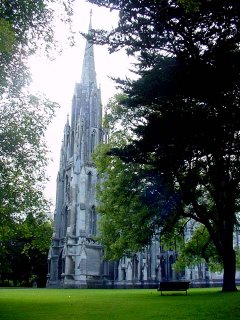 But perhaps all this activity also created an unusual people ... we like to think so ... unusual in a good way. The Scottish settlers gave us an ability to work hard , a strong founding economy with a weighting on education, and traveling so far to a new life surely developed a fierce independence.
But perhaps all this activity also created an unusual people ... we like to think so ... unusual in a good way. The Scottish settlers gave us an ability to work hard , a strong founding economy with a weighting on education, and traveling so far to a new life surely developed a fierce independence.They were followed by the gold miners, who added to the mix, bringing their spirit of enterprise, their love of sport, a strong tradition of music and theatre and a financial boom which meant that we ended up with our rather magnificent architecture.
Dunedin, it's a city of natural and architectural beauty ... it's my home town.
Tuesday, April 18, 2006
Tuf Tuf Bookshop, Antwerpen
 Tuf Tuf ... a secondhand bookshop on Geuzenstraat in Antwerpen.
Tuf Tuf ... a secondhand bookshop on Geuzenstraat in Antwerpen.What stunned me about this store was its stacks of books ... aisles are created by piles of books. In New Zealand this arrangement would be a massive earthquake risk.
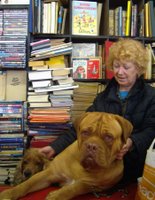 And as if that wasn't stunning enough ... being greeted by Vargas and Liliane was something else again ... Aslan and Shakra, the Cocker Spaniel crowd, also hang out behind the counter.
And as if that wasn't stunning enough ... being greeted by Vargas and Liliane was something else again ... Aslan and Shakra, the Cocker Spaniel crowd, also hang out behind the counter.  Talking with the Tuf Tuf bookstore owners, Gilbert and Liliane, I learned that two of the dogs were named after erotic magazine illustrators ... Vargas in Playboy and Aslan in Lui, a French magazine. I never knew that Playboy sometimes used illustrations as opposed to photographs ... until today.
Talking with the Tuf Tuf bookstore owners, Gilbert and Liliane, I learned that two of the dogs were named after erotic magazine illustrators ... Vargas in Playboy and Aslan in Lui, a French magazine. I never knew that Playboy sometimes used illustrations as opposed to photographs ... until today.The store opened for business back in 1989 in Oude Koornmarkt, moving to Geuzenstraat in 2002. So ... if the journey is your destination, then locating books here would satisfy you. Liliane, Gilbert, Vargas, Aslan and Shakra simply add to the experience.
I'm still smiling.
Billi Bierling and Miss Hawley
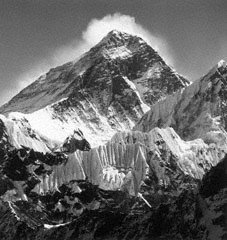 I was intrigued to read of Miss Hawley's assistant ... who in turn, talked of Miss Hawley, an interesting woman I'd never heard of before.
I was intrigued to read of Miss Hawley's assistant ... who in turn, talked of Miss Hawley, an interesting woman I'd never heard of before.The interview opens ...After four decades of tracking Himalayan expeditions, the legendary American chronicler Elizabeth Hawley missed the beginning of the current season: At 83, she had to undergo surgery in Thailand. Yet if climbers thought now was their chance to sneak out of Kathmandu un-noticed, they were wrong: German ex-pat Billi Bierling swiftly stepped in as Miss Hawley's 'mobile unit'. Racing across town on her bicycle, Billie feared no bandhs nor speeding tuk-tuks, chasing down climbing expeditions one after the other.
While writing of climbing sites ... Everest News is an interesting and comprehensive site for news Everest and so much more.
And international climbing magazines can be found here.
The Blogging Journalist
Munir Umrani, otherwise known as the The Blogging Journalist, posted an interesting link on why blogs are essential to a good career. However, he did follow it up with 'Would a boss like your blog?' which made me smile a little.
The New Zealand Embassy in Brussels
Wow ...
I just had to phone my embassy to enquire about some more extraordinarily irritating new pieces of documentation required.
My passport is not considered valid proof of nationality here in Belgium.
No no no ... I require a Bewijs van Nationaliteit
Hmmm, I wonder where the information about my nationality is gathered from?
So I phoned the Embassy and had conversations with a lovely Kiwi.
Nothing was a bother, we talked, there was laughter and the process is under way, well ... apart from my new $45nz Apostille to be attached to my new $26nz birth certificate to be translated into Nederlands by an official translator and taken to the court for verification, paid for and picked up ... surely a gazillionth new birth certificate in my 3 years abroad ... to be ordered by email, avoiding my sister selling me to the gypsies next time they're looking to purchase a demanding older sister surplus to requirement.
Ahhhh moving countries ...
Actually, I got into a conversation with a lovely Oxfam man on the street today. He's from the Netherlands and is having problems getting his university qualifications recognised here in Belgium.
I asked the obvious ... 'Why are you here?'
He rolled his eyes and said 'Love'.
Knowingly, I said 'Ahhhhhhhhhhh', and continued with, 'I'm not sure Belgians should be allowed out to find partners.'
He nodded, agreeing and accepted my excuse of 'I'm poorer than most Oxfam recipients at the moment'.
I wished him luck with his paperwork, he wished me luck with mine and said 'Perhaps when you have money you'll think of Oxfam'.
I said I would.
I just had to phone my embassy to enquire about some more extraordinarily irritating new pieces of documentation required.
My passport is not considered valid proof of nationality here in Belgium.
No no no ... I require a Bewijs van Nationaliteit
Hmmm, I wonder where the information about my nationality is gathered from?
So I phoned the Embassy and had conversations with a lovely Kiwi.
Nothing was a bother, we talked, there was laughter and the process is under way, well ... apart from my new $45nz Apostille to be attached to my new $26nz birth certificate to be translated into Nederlands by an official translator and taken to the court for verification, paid for and picked up ... surely a gazillionth new birth certificate in my 3 years abroad ... to be ordered by email, avoiding my sister selling me to the gypsies next time they're looking to purchase a demanding older sister surplus to requirement.
Ahhhh moving countries ...
Actually, I got into a conversation with a lovely Oxfam man on the street today. He's from the Netherlands and is having problems getting his university qualifications recognised here in Belgium.
I asked the obvious ... 'Why are you here?'
He rolled his eyes and said 'Love'.
Knowingly, I said 'Ahhhhhhhhhhh', and continued with, 'I'm not sure Belgians should be allowed out to find partners.'
He nodded, agreeing and accepted my excuse of 'I'm poorer than most Oxfam recipients at the moment'.
I wished him luck with his paperwork, he wished me luck with mine and said 'Perhaps when you have money you'll think of Oxfam'.
I said I would.
Some Of This Antwerpen Day
Easter is over, I was back at 'work' today and abandoned my desk for the city.
There's a point that you reach when you move countries; it's the moment you begin to know your way around and I reached it today. I caught the wrong tram, walked across a few streets, found the right tram line and arrived in the place that I wanted to be.
I had decided to explore the Turkish shopping street just beyond city centre. Found ... I wandered a while, not quite dancing the 'Di dance of happiness' when I found the rice for making Turkish rice, and buying some Eti cookies because they were there and I hadn't seen them since Istanbul. I recognised the big packets of good Turkish cay but I lacked the 24 euro for the overpriced double teapot. I even spotted some DoLuca wine ... the Turkish wine of choice during my first year in Turkey, on a shelf next to the Efes beer.
It was a successful morning and I came home via the supermarket, buying seriously healthy foodstuffs for my change of diet. However, before getting serious, I'm roasting New Zealand lamb tonight and we're drinking a lovely little Gigondas red. Tomorrow I become Di the Foodie Puritan, a woman who will undoubtably morph into Di the Witch as her body makes the adjustment ...
There's a point that you reach when you move countries; it's the moment you begin to know your way around and I reached it today. I caught the wrong tram, walked across a few streets, found the right tram line and arrived in the place that I wanted to be.
I had decided to explore the Turkish shopping street just beyond city centre. Found ... I wandered a while, not quite dancing the 'Di dance of happiness' when I found the rice for making Turkish rice, and buying some Eti cookies because they were there and I hadn't seen them since Istanbul. I recognised the big packets of good Turkish cay but I lacked the 24 euro for the overpriced double teapot. I even spotted some DoLuca wine ... the Turkish wine of choice during my first year in Turkey, on a shelf next to the Efes beer.
It was a successful morning and I came home via the supermarket, buying seriously healthy foodstuffs for my change of diet. However, before getting serious, I'm roasting New Zealand lamb tonight and we're drinking a lovely little Gigondas red. Tomorrow I become Di the Foodie Puritan, a woman who will undoubtably morph into Di the Witch as her body makes the adjustment ...
Monday, April 17, 2006
CIVIC and the Victims of War
I received an email today ... it seemed appropriate to pass it on ...
Note, the link to the Rolling Stone's article on Marla Ruzicka is well worth reading.
A Week of Action for Victims of War
Dear CIVIC Supporter,
On the road from Baghdad Airport one year ago yesterday, Marla Ruzicka and her colleague Faiz Ali Salim were killed by a suicide bomber while advocating on behalf of victims of war. Today we reflect on their powerful voices for compassion and remember all civilians killed or injured in conflict.
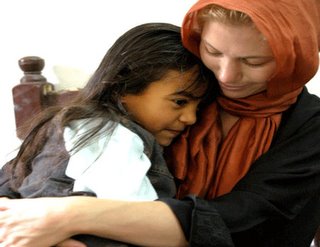 To mark this anniversary, we are launching a new website as well as a week-long advocacy campaign to raise awareness about the human cost of war.
To mark this anniversary, we are launching a new website as well as a week-long advocacy campaign to raise awareness about the human cost of war.
CIVIC continues to be a voice for civilians caught in the crossfire and we need your help. Starting today and continuing for four days, you will receive emails announcing the 'daily action.' Each action is created to inform, energize and expand support for this critical issue.
Please help us make this week a success by participating in whatever way makes sense to you and helping us spread the word.
Note, the link to the Rolling Stone's article on Marla Ruzicka is well worth reading.
A Week of Action for Victims of War
Dear CIVIC Supporter,
On the road from Baghdad Airport one year ago yesterday, Marla Ruzicka and her colleague Faiz Ali Salim were killed by a suicide bomber while advocating on behalf of victims of war. Today we reflect on their powerful voices for compassion and remember all civilians killed or injured in conflict.
 To mark this anniversary, we are launching a new website as well as a week-long advocacy campaign to raise awareness about the human cost of war.
To mark this anniversary, we are launching a new website as well as a week-long advocacy campaign to raise awareness about the human cost of war. CIVIC continues to be a voice for civilians caught in the crossfire and we need your help. Starting today and continuing for four days, you will receive emails announcing the 'daily action.' Each action is created to inform, energize and expand support for this critical issue.
Please help us make this week a success by participating in whatever way makes sense to you and helping us spread the word.
Milan Kundera, Writer
 I watched Milan Kundera's movie, The Unbearable Lightness of Being' and loved it. It made me curious about the man himself and while wandering, on this very grey Antwerpen day, I found an interesting interview with Milan.
I watched Milan Kundera's movie, The Unbearable Lightness of Being' and loved it. It made me curious about the man himself and while wandering, on this very grey Antwerpen day, I found an interesting interview with Milan.A grey day ... perhaps not actually so grey when I look outside but since I was small I have had days I described as being like grey-sundays-in-dunedin; a day made up of a particular boredom or feeling of emptiness that translates to the colour grey.
And so I've been webwandering between Easter outings and chores ... Kundera is fascinating, as was Fellini and Pirandello and I was intrigued by what Milan Kundera said of the translators of his writing ...
Alas, our translators betray us. They do not dare translate the unusual in our texts - the uncommon, the original. They fear that the critics will accuse them of translating badly. To protect themselves, they trivialize us. You have no idea how much time and energy I have lost correcting the translations of my books.
Later he says, Hermann Broch, the Austrian novelist whom I love above all, has said, ''The only morality for a writer is knowledge.'' Only a literary work that reveals an unknown fragment of human existence has a reason for being. To be a writer does not mean to preach a truth; it means to discover a truth.
Under the Tuscan Sun, Frances Mayes
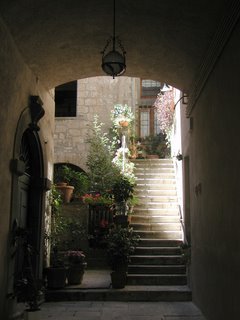 Sometimes, when I get caught in an aspect of life I don't particularly enjoy ... like moving house, like winter, or a grey Sunday ... I disappear into a book, searching for the experience or feeling that is eluding me in that moment.
Sometimes, when I get caught in an aspect of life I don't particularly enjoy ... like moving house, like winter, or a grey Sunday ... I disappear into a book, searching for the experience or feeling that is eluding me in that moment.Frances Mayes book, Under the Tuscan Sun, is one that travels with me where ever I go. It's a book that you can open at almost any point and read something beautiful.
'The table is set under a shady grape arbor. Cold salads, cold wine, fruit, a grand cheese souffle somehow steamed on top of the stove. Heat shimmers around the olive trees in the distance. On the stone patio, we're cool. We're introduced to the other guests: novelists, journalists, translators, a nonfiction writer - all older expatriates who've settled in these hills and restored properties. To live wholly in another country fascinates me.'
I went searching and found an interview with her ... in Salon, back in 1999.
Mayes has tapped into two of our culture's most potent and cherished myths: the you-can-start-all-over-again myth and the somewhere-there-is-time myth. In the case of Mayes and Tuscany, these myths have combined into something like this: Tuscany is a place where the pace of life still allows people to live gently and well, and if I move there, my life will magically change, too. Suddenly I'll have time to appreciate the world around me -- to linger in the garden and in the kitchen and over the table. Time to read and time to write. Time to talk to the neighbors and the shopkeepers. Time to savor life's little riches -- to watch the violets and hawthorn bloom, to smell the mesmerizing perfume of spring lilac -- and time to delight in life's huge disasters: when the pumps fail or the roof leaks or the walls crumble and sag.
I think this notion taps straight into our collective memory (or fantasy) of how life once was and is still supposed to be, just like the subtitle of "Bella Tuscany": "The sweet life in Italy."
Sunday, April 16, 2006
The Wisdom of Dogs
I'm obviously residing in one of Antwerpen's better suburbs; a place where dogs can read the signs on supermarket entrances ... Hier wacht ik op mijn baasje.
And clearly expectation has its own reward and the dogs think 'Oh, so here I wait for my master'.
It reminded me of another piece of canine intelligence hinted at back in New Zealand ... 'Guidedogs welcome' read signs on some shop doors. I was never sure whether it was written confirmation for the blind owner or the guide dog itself had been schooled in signage at guide dog school.
And clearly expectation has its own reward and the dogs think 'Oh, so here I wait for my master'.
It reminded me of another piece of canine intelligence hinted at back in New Zealand ... 'Guidedogs welcome' read signs on some shop doors. I was never sure whether it was written confirmation for the blind owner or the guide dog itself had been schooled in signage at guide dog school.
Milan Kundera, The Unbearable Lightness of Being
Anyone who thinks that the Communist regimes of Central Europe are exclusively the work of criminals is overlooking a basic truth: the criminal regimes are made not by criminals but by enthusiasts convinced they had discovered the only road to paradise. They defended that road so valiantly that they were forced to execute many people. Later it became clear that there was no paradise, that the enthusiasts were therefore murderers.
The brotherhood of man on earth will be possible only on a base of kitsch. And no one knows this better than politicians. Whenever a camera is in the offing, they immediately run to the nearest child, lift it in the air, kiss it on the cheek. Kitsch is the aesthetic ideal of all politicians and all political parties and movements.
In the realm of totalitarian kitsch, all answers are given in advance and prelude any questions. It follows, then, that the true opponent of totalitarian kitsch is the person who asks questions.
The brotherhood of man on earth will be possible only on a base of kitsch. And no one knows this better than politicians. Whenever a camera is in the offing, they immediately run to the nearest child, lift it in the air, kiss it on the cheek. Kitsch is the aesthetic ideal of all politicians and all political parties and movements.
In the realm of totalitarian kitsch, all answers are given in advance and prelude any questions. It follows, then, that the true opponent of totalitarian kitsch is the person who asks questions.
Saturday, April 15, 2006
Jean-Christophe Lafaille, Climber
An old friend emailed an interesting Observer Magazine article about the famous French climber, Jean-Christophe Lafaille.
Jason Burke wrote, On his last morning alive, Jean-Christophe Lafaille woke up perhaps the most profoundly alone man on the planet. His tiny tent, specially designed for ultra-high altitude, was perched on a small ridge at around 25,000ft on an icy shoulder of Makalu, the world's fifth largest mountain. Either side of the tent, huge rock and snow cliffs and avalanching slopes swept down to the distant valleys of the high Nepalese Himalayas. There was nothing above him except Makalu's summit, some 3,000ft higher.
 Lafaille had slept through his alarm and woken around 5am, when he called his wife Katia to tell her he was now up and moving. Ahead of him was a day that few normal human beings could have survived for more than a few minutes. Even by the standards of this most gifted and hardened mountaineer, the task Lafaille had set himself was almost unprecedented in modern mountaineering. Outside it was around -30C, still dark, with a light wind. The summit of Makalu would take 10 hours of hard and dangerous climbing to reach; up steep ice slopes, through crevasse-strewn glaciers and rocky cliffs, gasping in the thin air at an altitude at which passenger jets cruise. No one had ever climbed the mountain in winter before - let alone without oxygen, or back-up. Lafaille made himself a hot drink, ate a little, stuffed food and water in his rucksack, pulled on his boots and picked up his ice axes. Before leaving his tent, he rang his wife again. And then the finest climber in France, arguably in the world, disappeared.
Lafaille had slept through his alarm and woken around 5am, when he called his wife Katia to tell her he was now up and moving. Ahead of him was a day that few normal human beings could have survived for more than a few minutes. Even by the standards of this most gifted and hardened mountaineer, the task Lafaille had set himself was almost unprecedented in modern mountaineering. Outside it was around -30C, still dark, with a light wind. The summit of Makalu would take 10 hours of hard and dangerous climbing to reach; up steep ice slopes, through crevasse-strewn glaciers and rocky cliffs, gasping in the thin air at an altitude at which passenger jets cruise. No one had ever climbed the mountain in winter before - let alone without oxygen, or back-up. Lafaille made himself a hot drink, ate a little, stuffed food and water in his rucksack, pulled on his boots and picked up his ice axes. Before leaving his tent, he rang his wife again. And then the finest climber in France, arguably in the world, disappeared.
It was late January this year and Lafaille, 40, was climbing in the hardest way possible. He had no rope mates, no porters, no rescue team. At his base camp, 7,000ft below, there were three local Nepali sherpas with a radio. There were no other expeditions anywhere near him, and no one else on the mountain. Lafaille, as he always preferred, had the huge expanse of rock and snow and ice, and the cold and the wind and the great arcing vault of the Himalayan sky all to himself. His only link to the rest of mankind was a portable satellite telephone - which he had been using to call Katia and his four-year-old son several times a day.
This is a story of love and death, of the complex and often difficult relationship that a prodigiously gifted, driven man such as Lafaille can have with a sport - a sport which for him was a profession, a vocation and a passion. It is a tale of his extraordinary relationship, framed by the world's highest and most dangerous peaks, with his wife, lover, closest friend, professional partner and the mother of his child. This is the story of the short, happy life of Jean-Christophe Lafaille.
Jason Burke wrote, On his last morning alive, Jean-Christophe Lafaille woke up perhaps the most profoundly alone man on the planet. His tiny tent, specially designed for ultra-high altitude, was perched on a small ridge at around 25,000ft on an icy shoulder of Makalu, the world's fifth largest mountain. Either side of the tent, huge rock and snow cliffs and avalanching slopes swept down to the distant valleys of the high Nepalese Himalayas. There was nothing above him except Makalu's summit, some 3,000ft higher.
 Lafaille had slept through his alarm and woken around 5am, when he called his wife Katia to tell her he was now up and moving. Ahead of him was a day that few normal human beings could have survived for more than a few minutes. Even by the standards of this most gifted and hardened mountaineer, the task Lafaille had set himself was almost unprecedented in modern mountaineering. Outside it was around -30C, still dark, with a light wind. The summit of Makalu would take 10 hours of hard and dangerous climbing to reach; up steep ice slopes, through crevasse-strewn glaciers and rocky cliffs, gasping in the thin air at an altitude at which passenger jets cruise. No one had ever climbed the mountain in winter before - let alone without oxygen, or back-up. Lafaille made himself a hot drink, ate a little, stuffed food and water in his rucksack, pulled on his boots and picked up his ice axes. Before leaving his tent, he rang his wife again. And then the finest climber in France, arguably in the world, disappeared.
Lafaille had slept through his alarm and woken around 5am, when he called his wife Katia to tell her he was now up and moving. Ahead of him was a day that few normal human beings could have survived for more than a few minutes. Even by the standards of this most gifted and hardened mountaineer, the task Lafaille had set himself was almost unprecedented in modern mountaineering. Outside it was around -30C, still dark, with a light wind. The summit of Makalu would take 10 hours of hard and dangerous climbing to reach; up steep ice slopes, through crevasse-strewn glaciers and rocky cliffs, gasping in the thin air at an altitude at which passenger jets cruise. No one had ever climbed the mountain in winter before - let alone without oxygen, or back-up. Lafaille made himself a hot drink, ate a little, stuffed food and water in his rucksack, pulled on his boots and picked up his ice axes. Before leaving his tent, he rang his wife again. And then the finest climber in France, arguably in the world, disappeared.It was late January this year and Lafaille, 40, was climbing in the hardest way possible. He had no rope mates, no porters, no rescue team. At his base camp, 7,000ft below, there were three local Nepali sherpas with a radio. There were no other expeditions anywhere near him, and no one else on the mountain. Lafaille, as he always preferred, had the huge expanse of rock and snow and ice, and the cold and the wind and the great arcing vault of the Himalayan sky all to himself. His only link to the rest of mankind was a portable satellite telephone - which he had been using to call Katia and his four-year-old son several times a day.
This is a story of love and death, of the complex and often difficult relationship that a prodigiously gifted, driven man such as Lafaille can have with a sport - a sport which for him was a profession, a vocation and a passion. It is a tale of his extraordinary relationship, framed by the world's highest and most dangerous peaks, with his wife, lover, closest friend, professional partner and the mother of his child. This is the story of the short, happy life of Jean-Christophe Lafaille.
Southern Hemisphere Confusions Up North
Easter ... and already my mind has leapt ahead to ANZAC Day with the Kiwis and Australians in Ieper and Messine ... and on again, to May harassing Diede and Francien in the Netherlands, and on into July when we meet friends in Scotland.
Coming from the Southern Hemisphere, living in the Northern Hemisphere, perhaps Easter is the only holiday where the weather is similar ... where it seems possible that it is actually Easter, rather than some Northern Hemisphere confusion.
Christmas in winter is bizarre beyond words ... cherries and strawberries herald a Kiwi Christmas, blue skies and sunshine, long summer holidays and days at the beach or the river, time at the crib (South Island), bach (North Island), summer house (rest of the world).
Christmas first became a non-event in Turkey, I taught conversation class to university students on my last Christmas Day in Turkey.
 Christmas in Belgium ... the ice, the snow, the misery ... it did occur to me that this is the Christmas portrayed on our christmas cards back home ... mmm, ties with old Mother England took some breaking. We still have snow scenes on christmas cards but change has been hovering in the air for some years now, Christine and Peter sent me my Santa in jandals and Bemuda shorts.
Christmas in Belgium ... the ice, the snow, the misery ... it did occur to me that this is the Christmas portrayed on our christmas cards back home ... mmm, ties with old Mother England took some breaking. We still have snow scenes on christmas cards but change has been hovering in the air for some years now, Christine and Peter sent me my Santa in jandals and Bemuda shorts.
Birthdays ... I was already a forgetful criminal but imagine, Dad's June birthday is suddenly in summer ... the unconscious mind plays more tricks than you know. I recall panicking in winter ... not in summer.
Mostly I wander in Di World and take special care crossing the road ... how anyone manages to reverse into a carpark the way these wrong-sided-driving Europeans do, is beyond me. A face-saving comment, as learning Belgium's road rules is also beyond me ...
Complaining ... no, just reflecting noisily on the difference between north and south.
Coming from the Southern Hemisphere, living in the Northern Hemisphere, perhaps Easter is the only holiday where the weather is similar ... where it seems possible that it is actually Easter, rather than some Northern Hemisphere confusion.
Christmas in winter is bizarre beyond words ... cherries and strawberries herald a Kiwi Christmas, blue skies and sunshine, long summer holidays and days at the beach or the river, time at the crib (South Island), bach (North Island), summer house (rest of the world).
Christmas first became a non-event in Turkey, I taught conversation class to university students on my last Christmas Day in Turkey.
 Christmas in Belgium ... the ice, the snow, the misery ... it did occur to me that this is the Christmas portrayed on our christmas cards back home ... mmm, ties with old Mother England took some breaking. We still have snow scenes on christmas cards but change has been hovering in the air for some years now, Christine and Peter sent me my Santa in jandals and Bemuda shorts.
Christmas in Belgium ... the ice, the snow, the misery ... it did occur to me that this is the Christmas portrayed on our christmas cards back home ... mmm, ties with old Mother England took some breaking. We still have snow scenes on christmas cards but change has been hovering in the air for some years now, Christine and Peter sent me my Santa in jandals and Bemuda shorts.Birthdays ... I was already a forgetful criminal but imagine, Dad's June birthday is suddenly in summer ... the unconscious mind plays more tricks than you know. I recall panicking in winter ... not in summer.
Mostly I wander in Di World and take special care crossing the road ... how anyone manages to reverse into a carpark the way these wrong-sided-driving Europeans do, is beyond me. A face-saving comment, as learning Belgium's road rules is also beyond me ...
Complaining ... no, just reflecting noisily on the difference between north and south.
Friday, April 14, 2006
An Interesting Site
 Montage-a-google is a simple web-based application that uses Google's image search to generate a large gridded montage of images based on keywords entered by the user. Not only an interesting way of browsing the net, it can also be used to create desktop pictures or even posters ...
Montage-a-google is a simple web-based application that uses Google's image search to generate a large gridded montage of images based on keywords entered by the user. Not only an interesting way of browsing the net, it can also be used to create desktop pictures or even posters ...
Life In Other Places
Laila El-Haddad lives in Gaza City and writes for newspapers like The Guardian while maintaining her own blog.
Germany's Klofrau
I had never paid to use a bathroom back in New Zealand however Turkey soon taught me that it's better to carry a little spare change when popping into a public toilet.
The reward ... a sparkling clean bathroom, well if the toilet attendent is inspired.
It's the same here in Belgium ... stunning stuff really and yet, perhaps not so silly. Anyway, der Spiegel wrote up Germany's equivalent, the Klofrau or "toilet lady". It's an interesting and amusing article.
The reward ... a sparkling clean bathroom, well if the toilet attendent is inspired.
It's the same here in Belgium ... stunning stuff really and yet, perhaps not so silly. Anyway, der Spiegel wrote up Germany's equivalent, the Klofrau or "toilet lady". It's an interesting and amusing article.
An Antwerpen Window
Antwerpen's Iconic New Landmark
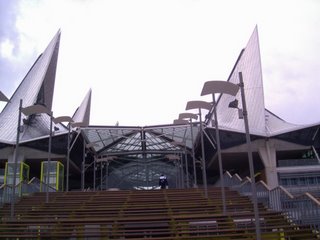 Or so proclaims everything I found when I tried researching the new Courthouse, situated at Simon Bolivarplaats on the edge of Antwerp city centre. Straddling a major motorway interchange leading into the city, the new law courts have been conceived as a symbolic gateway to the city.
Or so proclaims everything I found when I tried researching the new Courthouse, situated at Simon Bolivarplaats on the edge of Antwerp city centre. Straddling a major motorway interchange leading into the city, the new law courts have been conceived as a symbolic gateway to the city. The court house was officially opened on March 28, 2006 by Belgium's King Albert II and makes a rather stunning addition to the cityscape. We caught the No 8 tram to the end of the line, then strolled up Emiel Banningstraat, taking photographs as we wandered.
The court house was officially opened on March 28, 2006 by Belgium's King Albert II and makes a rather stunning addition to the cityscape. We caught the No 8 tram to the end of the line, then strolled up Emiel Banningstraat, taking photographs as we wandered.It's a wee bit of a postmodern feast for the eyes ... and being a 21st century creation, it's also environmentally friendly. Natural light is used to optimum effect, rainwater is recycled, and low velocity ventilation is used in the hearing rooms ... all made totally believable when you see the paraboloid roof.
But I don't do it justice here ... if you're curious to know more, follow this link to a rather superb Guardian newspaper article.
Thursday, April 13, 2006
Paul Kelly, Musician
 I was working on the post about 'neighbours' when Paul Kelly's song 'Midnight Rain' started playing.
I was working on the post about 'neighbours' when Paul Kelly's song 'Midnight Rain' started playing.I love Paul Kelly's music, most particularly 'Midnight Rain'.
The song opens with the sound of rain falling in that heavy-wet-rain kind of way that it did back home in New Zealand sometimes ... I can't resist it.
Then Paul comes in singing
Something woke me up
It must have been the rain ...
I went searching and found his website , it's better than I could have imagined.
Kelly has released nine more albums and channelled his talents towards theatre, film soundtracks, acting, record production and songwriting with and for other artists. American critics have been as effusive as their Australian counterparts. David Fricke, music editor of Rolling Stone magazine in the US, called Kelly 'one of the finest songwriters I have ever heard, Australian or otherwise'. In a review of 'Lyrics', the 1993 collection of Kelly's song lyrics, Dr Imre Salusinszky of the Newcastle University English Department described Kelly as 'our best songwriter and one of our finest poets'.
'Lyrics' opens with a quote from Anton Chekhov: 'I don't have what you would call a philosophy or coherent world view so I shall have to limit myself to describing how my heroes love, marry, give birth, die and speak.' It's a viewpoint Kelly has stressed over the years. 'I'd like to make clear that my records aren't autobiography,' he once said. 'I'm not trying to tell my life and my experiences. The first thing I'm trying to do is write songs, rather than make confessions or bare my soul.'
Midnight Rain ... will the lyrics translate as a song you want to hunt down?
I wonder.
Something woke me up
Must have been the rain
And for no good reason here you are
Inside my head again
I know I won't go back to sleep now
I'm in a mood
Must be the midnight rain, the midnight rain
So I get up and wander around
In my dressing gown
Put the kettle on, some music too
But not too loud 'cause the neighbours complain
So I keep it soft and low just about the sound
Of the midnight rain, midnight rain
Yeah, you told me so
I didn't want to know
You sure told me so
Don't you let a good thing go
What coast are you on? What country?
Is it raining there? Is it morning or midnight?
Are you walking barefoot or have you got your shoes on?
Is there somebody there with you?
Are you talking soft and low underneath the sound
Of the midnight rain, midnight rain?
I just want you to know where ever you are
Where ever you go
I hope you're under a lucky star
Where ever you are.
The Word Is Out ...
 I have more new neighbours ... two 'levels' down from the nest of the Belgian magpie, a pigeon has moved in and set up home.
I have more new neighbours ... two 'levels' down from the nest of the Belgian magpie, a pigeon has moved in and set up home.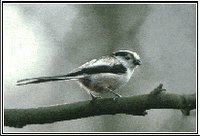 The pigeons pop over to the balcony daily, talking pigeon-talk with the little Turkish turtle dove (tortelduif) who must have heard that I once lived in Istanbul.
The pigeons pop over to the balcony daily, talking pigeon-talk with the little Turkish turtle dove (tortelduif) who must have heard that I once lived in Istanbul.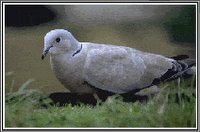
Not only that, in the brick divider that seperates the balcony from the neighbours balcony, some kind of tomtit is making its home. Looking at photographs didn't help ... it's either a koolmees (mousetit), pimpelmees (bluetit), a zwarte mees (blacktit) or a staartmees.
He had shown me how to write. He had taught me to find the courage to climb down into myself. The unconscious is full of darkness, Oedipal stand-ins, broken legends, half-told tales. A shaky ladder with rotten rungs descends into it. Another golden ladder may take you to the stars but first you must find yourself in the dark.
If you don't know yourself, how can you find anything?'
Erica Jong
from, Fear of Fifty
If you don't know yourself, how can you find anything?'
Erica Jong
from, Fear of Fifty
A Candid Camera Kind of Day
Today I discovered that my passport lacks necessary authority in terms of proof of nationality ...
Sometimes, just sometimes, in being processed for a new country ... I look round for hidden cameras and wait for the laughter and cries of ... 'Just kidding!! And you're on Candid Camera!'
They never come.
Sometimes, just sometimes, in being processed for a new country ... I look round for hidden cameras and wait for the laughter and cries of ... 'Just kidding!! And you're on Candid Camera!'
They never come.
Wednesday, April 12, 2006
The Territory Called 'Desk'
Each day Gert goes off to work, leaving his desk and computer unprotected ...
My territorial infringement begins innocently enough, his computer has better speakers and he can do computer-ese, so the music is all on his side.
My computer is on, my desk is overflowing with papers and books; his computer is on, and his desk has a lot of clear space and order.
His computer's memory is bigger than mine and after many years of nagging by my computer-savvy men friends, my photographs are all backed up on his computer ... just in case, god forbid, my laptop dies. So the music's playing and I'm writing a post for the blog, I need a photograph or two, so I move to his desk ... rolling his office chair back over from mine.
When I was interviewing the New Zealand climbers, I was told stories of ... well appropriation of property belonging to other climbers. One of my 'interviewees' had been up on K2 with his Kiwi expedition group. There were many nationalities, some kinder (perhaps more gullible) than others. He told me of the nightly meetings in Camp Kiwi where the competition points were tallied up ... who had appropriated, stolen, been given, 'borrowed' the best stuff. Oh those kiwis ... so it's no surprise to me that I have already appropriated (such a nice word) Gert's office chair.
Actually, as an aside, I was an Airforce wife for 4 years and while tagging along on a tour being given to a visiting American officer, I remember his shocked 'Where did you get that from!?' The Kiwi officer said with a smile, 'Oh we retrieved it...' It was a contemporary piece of American military property ... something they shouldn't have had but then Kiwis have a little bit of everything from everyone back in New Zealand but we're not bad people, rather sweet really.
So ... I have Gert's chair, his computer is playing my music, I'm using it to post the photographs on my blog ... so I may as well stay there and write the post, changing his keyboard from Dutch to English. My books my papers my pens and pencils all make their way over to his side, lightening the load on my desk a little.
My coffee cup, my box of tissues, my hand cream, my phone and a plate with toast crumbs.
Suddenly, the day is gone and he's on his way home. So begins the mad rush to clear his desk, to reunite it with his psyche, taking away all traces of mine ... well, taking his office chair back to my side.
I'm not bad at it, there haven't been too many complaints, although he misses the good pencils, the stapler and paper clip holder on occasion but I'm benevolent ... what's on mine is his.
My territorial infringement begins innocently enough, his computer has better speakers and he can do computer-ese, so the music is all on his side.
My computer is on, my desk is overflowing with papers and books; his computer is on, and his desk has a lot of clear space and order.
His computer's memory is bigger than mine and after many years of nagging by my computer-savvy men friends, my photographs are all backed up on his computer ... just in case, god forbid, my laptop dies. So the music's playing and I'm writing a post for the blog, I need a photograph or two, so I move to his desk ... rolling his office chair back over from mine.
When I was interviewing the New Zealand climbers, I was told stories of ... well appropriation of property belonging to other climbers. One of my 'interviewees' had been up on K2 with his Kiwi expedition group. There were many nationalities, some kinder (perhaps more gullible) than others. He told me of the nightly meetings in Camp Kiwi where the competition points were tallied up ... who had appropriated, stolen, been given, 'borrowed' the best stuff. Oh those kiwis ... so it's no surprise to me that I have already appropriated (such a nice word) Gert's office chair.
Actually, as an aside, I was an Airforce wife for 4 years and while tagging along on a tour being given to a visiting American officer, I remember his shocked 'Where did you get that from!?' The Kiwi officer said with a smile, 'Oh we retrieved it...' It was a contemporary piece of American military property ... something they shouldn't have had but then Kiwis have a little bit of everything from everyone back in New Zealand but we're not bad people, rather sweet really.
So ... I have Gert's chair, his computer is playing my music, I'm using it to post the photographs on my blog ... so I may as well stay there and write the post, changing his keyboard from Dutch to English. My books my papers my pens and pencils all make their way over to his side, lightening the load on my desk a little.
My coffee cup, my box of tissues, my hand cream, my phone and a plate with toast crumbs.
Suddenly, the day is gone and he's on his way home. So begins the mad rush to clear his desk, to reunite it with his psyche, taking away all traces of mine ... well, taking his office chair back to my side.
I'm not bad at it, there haven't been too many complaints, although he misses the good pencils, the stapler and paper clip holder on occasion but I'm benevolent ... what's on mine is his.
Rome
The wandering turk is travelling again. He wrote, San Francisco is quickly climbing up the charts to become my favorite city in the US. I love the fact that one can walk pretty much anywhere. I love the fact that public transportation actually gets you to where you need to go. I love all the different cultures, harmoniously intermingling. I love the food...
His post made me think about cities I've fallen in love with ...
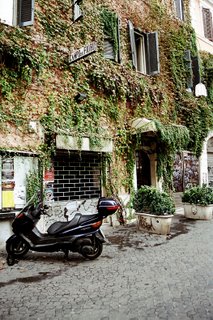 It's clear I get homesick for Istanbul but I fell madly and passionately in love with Rome. I wandered there expecting to be disappointed by a myth fallen on hard times and found something else ... a city that was more than I imagined a city could be ... a mix of ancient and beautiful, sophistication and real people who wanted to chat ... (or show me the kitchen down in the ancient restaurant basement, as was the case with dear Enzo. I declined, not sure about visiting ancient kitchens with waiters who kissed hands).
It's clear I get homesick for Istanbul but I fell madly and passionately in love with Rome. I wandered there expecting to be disappointed by a myth fallen on hard times and found something else ... a city that was more than I imagined a city could be ... a mix of ancient and beautiful, sophistication and real people who wanted to chat ... (or show me the kitchen down in the ancient restaurant basement, as was the case with dear Enzo. I declined, not sure about visiting ancient kitchens with waiters who kissed hands).
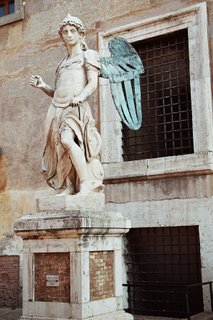 I stayed on Campo de' Fiori in a hotel with the same name ... the entrance was stunning. There was a daily market in the square ... flowers, food and 'things', with a superb little bookshop where I found a good book, and in another corner, a delicatessen with wine and cheese for my evening ... because I was in Rome.
I stayed on Campo de' Fiori in a hotel with the same name ... the entrance was stunning. There was a daily market in the square ... flowers, food and 'things', with a superb little bookshop where I found a good book, and in another corner, a delicatessen with wine and cheese for my evening ... because I was in Rome.
It was a city of angels ... Bernini and his students had sculpted a series of them on Ponte Sant'Angelo in the 17th century, and across the bridge, Castel Sant'Angelo seemed full of them ... arrogant angels like Raffaello da Montelupo's 1544 rendering of the Archangel Michael and Peter Anton Verschaffelt's rooftop Michael, sculpted 1752.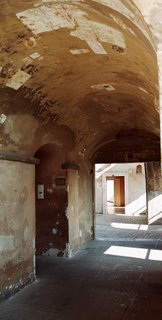
Angels and archways perhaps. I fell in love with the architecture too. I spent hours in Castel Sant'Angelo, fascinated by the history and feel of it. It was originally built as a mausoleum for Hadrian, as in Hadrian's Tomb, but was converted into a fortress for popes in the 6th century. It was magical wandering there, or just sitting in the sun trying to comprehend that that really was Roma's River Tiber below me.
I had lunch with Paolo, a friend of a friend and we wandered the city some. An old friend took me home to his family for dinner on the back of his scooter, his wife cooked a beautiful Roman feast, introducing me to mozzarella di bufala, prosciutto parma and bread, then veal, artichokes and chard ... and a midnight tour of Rome.
I bought a painting from another Paolo, in Piazza Navone ... the place where the artists gather and he took me off to a cafe for coffee. We talked for a long time, he had been a history teacher until his art had become self-supporting. We talked of movies, books, writers, societies, children and life ... it was magic. The painting was a titled 'Diving into Life' and in Italian he had written 'detail of the Greek diver VIII century BC' ... it seemed like something I had to have.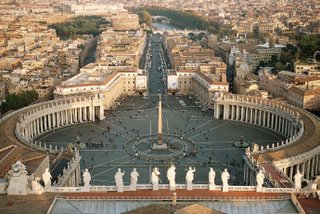
I loved Piazza San Pietro in Vatican City and bought the ticket that allows one to climb the 300+ steps to the cupola on top of the Basilica ... there's no turning back once you enter the stairway but the view of Rome laid out below you more than makes up for any claustrophobic or heart attack-type thoughts entertained on the way up.
Inside the Basilica ... the sculptures are outside my powers of description ... I stared for a long time, perhaps wanting an absorption of beauty by osmosis. Michelangelo's Pieta was stunning but Bernini's monument to Alexander VII was almost overwhelming ... somehow, Bernini had made heavy red marble resemble soft velvet.
I have no individual favourite, I loved it all ... the Pantheon took my breath when I turned a corner and found it in front of me. The Colosseum, the Trevi Fountain and the Spanish Steps ... I have to go back, there's no other solution.
His post made me think about cities I've fallen in love with ...
 It's clear I get homesick for Istanbul but I fell madly and passionately in love with Rome. I wandered there expecting to be disappointed by a myth fallen on hard times and found something else ... a city that was more than I imagined a city could be ... a mix of ancient and beautiful, sophistication and real people who wanted to chat ... (or show me the kitchen down in the ancient restaurant basement, as was the case with dear Enzo. I declined, not sure about visiting ancient kitchens with waiters who kissed hands).
It's clear I get homesick for Istanbul but I fell madly and passionately in love with Rome. I wandered there expecting to be disappointed by a myth fallen on hard times and found something else ... a city that was more than I imagined a city could be ... a mix of ancient and beautiful, sophistication and real people who wanted to chat ... (or show me the kitchen down in the ancient restaurant basement, as was the case with dear Enzo. I declined, not sure about visiting ancient kitchens with waiters who kissed hands). I stayed on Campo de' Fiori in a hotel with the same name ... the entrance was stunning. There was a daily market in the square ... flowers, food and 'things', with a superb little bookshop where I found a good book, and in another corner, a delicatessen with wine and cheese for my evening ... because I was in Rome.
I stayed on Campo de' Fiori in a hotel with the same name ... the entrance was stunning. There was a daily market in the square ... flowers, food and 'things', with a superb little bookshop where I found a good book, and in another corner, a delicatessen with wine and cheese for my evening ... because I was in Rome.It was a city of angels ... Bernini and his students had sculpted a series of them on Ponte Sant'Angelo in the 17th century, and across the bridge, Castel Sant'Angelo seemed full of them ... arrogant angels like Raffaello da Montelupo's 1544 rendering of the Archangel Michael and Peter Anton Verschaffelt's rooftop Michael, sculpted 1752.

Angels and archways perhaps. I fell in love with the architecture too. I spent hours in Castel Sant'Angelo, fascinated by the history and feel of it. It was originally built as a mausoleum for Hadrian, as in Hadrian's Tomb, but was converted into a fortress for popes in the 6th century. It was magical wandering there, or just sitting in the sun trying to comprehend that that really was Roma's River Tiber below me.
I had lunch with Paolo, a friend of a friend and we wandered the city some. An old friend took me home to his family for dinner on the back of his scooter, his wife cooked a beautiful Roman feast, introducing me to mozzarella di bufala, prosciutto parma and bread, then veal, artichokes and chard ... and a midnight tour of Rome.
I bought a painting from another Paolo, in Piazza Navone ... the place where the artists gather and he took me off to a cafe for coffee. We talked for a long time, he had been a history teacher until his art had become self-supporting. We talked of movies, books, writers, societies, children and life ... it was magic. The painting was a titled 'Diving into Life' and in Italian he had written 'detail of the Greek diver VIII century BC' ... it seemed like something I had to have.

I loved Piazza San Pietro in Vatican City and bought the ticket that allows one to climb the 300+ steps to the cupola on top of the Basilica ... there's no turning back once you enter the stairway but the view of Rome laid out below you more than makes up for any claustrophobic or heart attack-type thoughts entertained on the way up.
Inside the Basilica ... the sculptures are outside my powers of description ... I stared for a long time, perhaps wanting an absorption of beauty by osmosis. Michelangelo's Pieta was stunning but Bernini's monument to Alexander VII was almost overwhelming ... somehow, Bernini had made heavy red marble resemble soft velvet.
I have no individual favourite, I loved it all ... the Pantheon took my breath when I turned a corner and found it in front of me. The Colosseum, the Trevi Fountain and the Spanish Steps ... I have to go back, there's no other solution.
Translation
"Reading a poem in translation," wrote Bialek, "is like kissing a woman through a veil"; and reading Greek poems, with a mixture of katharevousa and the demotic, is like kissing two women.
Translation is a kind of transubstantiation; one poem becomes another. You can choose your philosophy of translation just as you choose how to live: the free adaptation that sacrifices detail to meaning, the strict crib that sacrifices meaning to exactitude.
The poet moves from life to language, the translator moves from language to life; both, like the immigrant, try to identify the invisible, what's between the lines, the mysterious implications.
Anne Michaels
from, Fugitive Pieces
Translation is a kind of transubstantiation; one poem becomes another. You can choose your philosophy of translation just as you choose how to live: the free adaptation that sacrifices detail to meaning, the strict crib that sacrifices meaning to exactitude.
The poet moves from life to language, the translator moves from language to life; both, like the immigrant, try to identify the invisible, what's between the lines, the mysterious implications.
Anne Michaels
from, Fugitive Pieces
Tuesday, April 11, 2006
A Variation

I've just spent the last 24 hours immersed, but for a few hours of sleep, in the life of an interesting person. Research over, I lay down on the couch for a moment and woke two hours later ... I guess I can't weep over being an in-process immigrant any longer... I am slowly but surely being outed as a woman who wants to write and has the leisuretime to nap after a big job. And what corporation would hire me ... Di, oh she was sleeping on the couch in the staffroom last time I saw her, the Peterson deal exhausted her.
After wandering the world in pursuit of my story, I emerged blinking owlishly, wondering at the peace of an Antwerpen day after hours of online video clips made in warzones.
I'm still not quite back ... normal service will resume as soon as I recover.
Monday, April 10, 2006
Things Left Behind.
Thing: an object that one need not, cannot, or does not wish to give a specific name to. (things) personal belongings or clothing. 2. an inanimate material object, especially as distinct from a living sentient being.
This morning it occured to me that my life has been so much about leaving things behind ...
And it should go without saying, I miss people more, but today I was thinking of things missed.
I lived in one place until I was 20 and so nothing prepared me for the constant stream-lining of possessions that lay ahead of me. I moved house at least 11 times during my marriage, then 4 times after the divorce and before leaving for Turkey ... two homes in Istanbul and now here I am, unbelievably possessionless in Belgium.
I have so many books, a beautiful desk and chair, and a bed that I love back in New Zealand ... photo albums, precious things like that.
I left my winter clothing back in Istanbul, with other things ousted by my 240euro excess book luggage ... I was flying back there last September but haven't managed it yet ... waiting to be legal, then legal to work.
Here ... I have two journals, a laptop full of photographs, my cds and dvds, my camera gear and my books.
The oddest things make me remember ... this time it was the new cup we bought yesterday. I love beautiful things ... the shape, the colour, how it fits in my hand, and what I feel when I use it.
The new cup has made me nostalgic for things left behind ... in Istanbul and in New Zealand.
Mostly I don't think of these things but sometimes, just sometimes, I miss them.
This morning it occured to me that my life has been so much about leaving things behind ...

And it should go without saying, I miss people more, but today I was thinking of things missed.
I lived in one place until I was 20 and so nothing prepared me for the constant stream-lining of possessions that lay ahead of me. I moved house at least 11 times during my marriage, then 4 times after the divorce and before leaving for Turkey ... two homes in Istanbul and now here I am, unbelievably possessionless in Belgium.
I have so many books, a beautiful desk and chair, and a bed that I love back in New Zealand ... photo albums, precious things like that.
I left my winter clothing back in Istanbul, with other things ousted by my 240euro excess book luggage ... I was flying back there last September but haven't managed it yet ... waiting to be legal, then legal to work.
Here ... I have two journals, a laptop full of photographs, my cds and dvds, my camera gear and my books.
The oddest things make me remember ... this time it was the new cup we bought yesterday. I love beautiful things ... the shape, the colour, how it fits in my hand, and what I feel when I use it.
The new cup has made me nostalgic for things left behind ... in Istanbul and in New Zealand.
Mostly I don't think of these things but sometimes, just sometimes, I miss them.
Subscribe to:
Posts (Atom)
